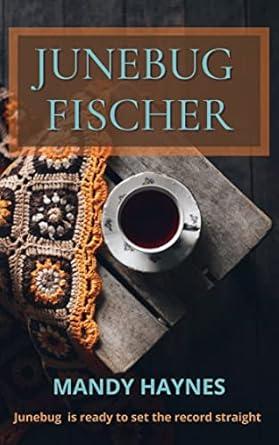




Stephanie Edwards brings the bookish community together to provide some relief to everyone impacted by Hurricane Helene
Stephanie Edwards
I was supposed to go to Charleston for a quick vacation and to promote my (then) upcoming novel, Lowcountry Charm, in mid-September.The threat of bad weather ruined my plans…or so I thought. My husband and I decided to visit our old standby –Asheville, North Carolina – instead. Our three-day trip was perfect—we enjoyed all of our favorite haunts and discovered new ones, an unexpected feat after almost 25 years of traveling there together. The two-hour drive from Knoxville, makes the eclectic mountain town an attractive destination for us. We took our first trip as a couple there and have spent many long weekends soaking up history and beauty at Biltmore Estate, as well as dining, shopping and exploring all of Asheville and its neighboring communities. We love them all. Asheville also serves as our gateway to my beloved Lowcountry, making it even more special. It will forever be
anchored as an integral part of our relationship and who I am as a person.
A week after our most recent trip to Asheville, Helene made landfall as a category 4 hurricane, cruelly destroying parts of Florida. Weather forecasters called for flooding and high winds in the rest of the Southeast, but nothing could have prepared us for the utter destruction and devastation Helene brought hundreds of miles inland to Northeastern Tennessee, Western North Carolina, South Carolina, Georgia and Virginia.
You can imagine my reaction to seeing the footage and photos posted by people from these areas. It seemed unreal that Helene’s floodwaters destroyed sections of towns like Newport and Erwin in Tennessee (just an hour to an hour and a half away from my home) and many beautiful places in Western North Carolina. We had just driven through Newport and spent our peaceful vacation in Asheville. The places and people I love were suffering, and I couldn’t bear the thought of it.
I knew I had to help, so I built theAuthors forAppalachia Facebook community and started reaching out to authors to see if they’d contribute items for an online auction to be held from 9 a.m. on Nov. 1 EST to 9 a.m. on Nov. 8 to benefit relief efforts by Samaritan’s Purse. To say the very least, I’ve been overwhelmed by the great generosity of our bookish community and those who love Appalachia as
much as I do. We’ve already had some tremendous monetary donations, that have gone straight to Samaritan’s Purse. But I can’t wait to see how much more we raise as readers bid on some incredible auction items.
What’s on the auction block?
Bestselling and award-winning authors like Susan M. Boyer, Kimberly Brock, Barbara Conrey, Hope Gibbs, Tina Hogan Grant and Laura Kemp have contributed signed copies and/or book gift sets. Also, authors won’t want to miss opportunities to refine their manuscripts by bidding on coveted consultation packages from NYC-based agent Liza Fleissig from the Liza Royce Agency and professional editor LindaAlbert.
Why did you choose Samaritan’s Purse as the beneficiary for the auction?
Some religious organizations get a bad rap at times. This group, in particular, found ways to reach most of the hardest hit places throughout the Southeast to deliver safety, supplies, and hope to many.
Questions can be directed to: authorsforappalachia@gmail.com or to Stephanie Edwards on Facebook Messenger.

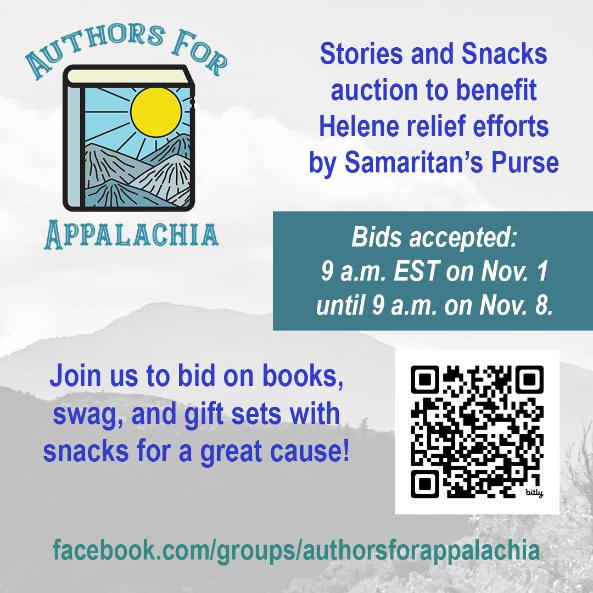



Clickheretojointhe AuthorsforAppalachia FacebookGroup
Stephanie Edwards has been writing professionally since she landed her first newspaper column at the age of 13. Her love for the Lowcountry, the Atlantic Ocean, and a good ghost story inspired her to write her first book, The Haunting on Palm Court: An Isle of Palms Suspense. A stay at a beach cottage with a spooky backyard, filled with old oak trees, brought the novel and two subsequent books in the series to life. All these books reached No. 1 on the Southern Fiction New Releases list on Amazon. Stephanie released Lowcountry Charm, the prequel to the series, on Oct. 25, 2024. She lives in Tennessee with her husband, Ron, and their adorable rescue pup, Shadow. Be sure to keep up with publication dates, events, and other news at www.stephedwardswrites.com.

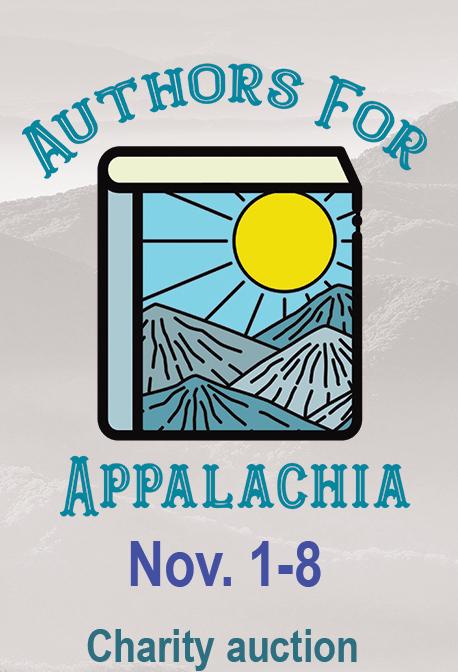

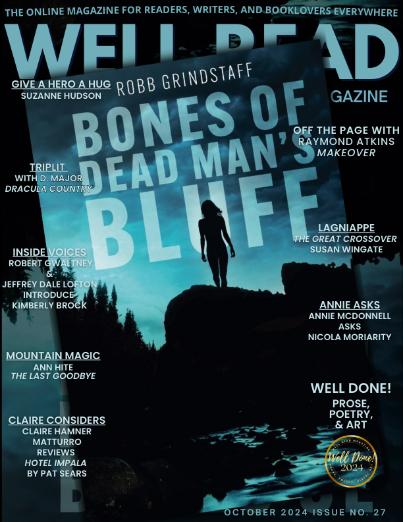
Did you miss last month’s issue? No worries, click here to find it as well as all the past issues.

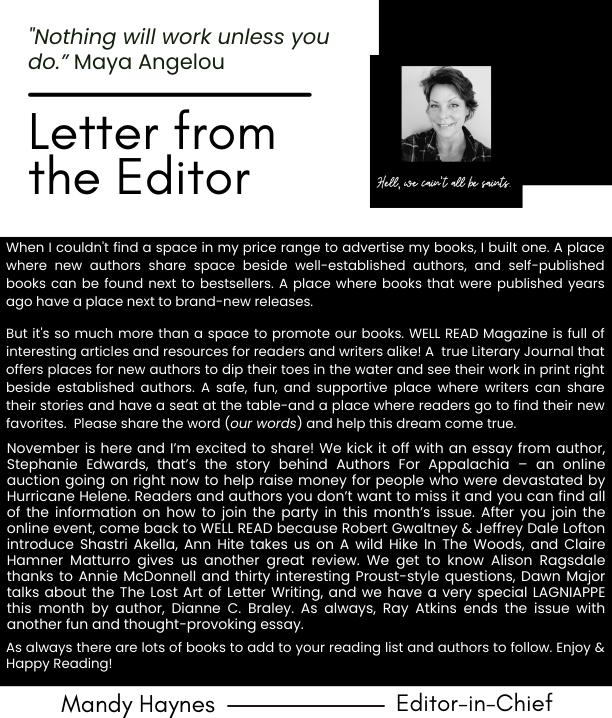






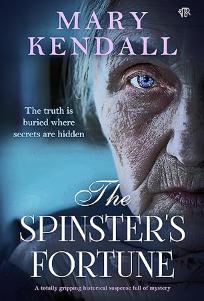
The Spinster's Fortune: A totally gripping historical suspense full of mystery by Mary Kendall
A woman searches for her ailing aunt’s hidden riches in this “perfect blend of history, mystery, family secrets and suspense”Kate Braithwaite, author of The Puzzle of Nelly Bly
In 1929, Blanche Magruder lies alone in a home for the elderly and infirm without a penny to her name, suspected of being of unsound mind. Meanwhile, her house, a crumbling ruin in the Georgetown section of Washington, DC, is regularly ransacked by thieves looking for a fortune believed to be hidden there.
When distant niece Margaret O’Keefe is made executor of Blanche’s estate, she becomes embroiled in the treasure hunt, embracing it as a welcome escape from her own financial and marital woes. But as Margaret continues to investigate, family mysteries begin to unravel. Soon, she begins to question whether Aunt Blanche is a senile fool, and whether she really belongs in the home. But can she find out where the lies end and the truth begins?
Shrouded in gothic undertones, The Spinster’s Fortune is a strange and twisting journey through tangled webs of family deceit.
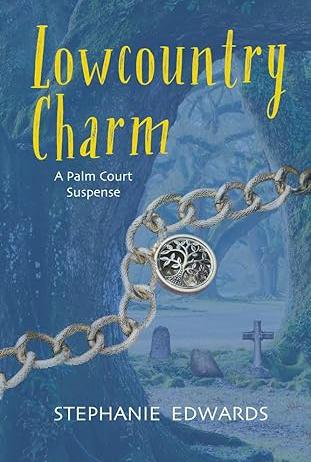
by Stephanie Edwards
Nancy Parsons becomes the sole caregiver to her fivegrandsons,followinga fatalcaraccidentinvolving her son and daughter-inlaw. As unexplainable and frightening occurrences take place, Nancy works to identify who is responsible and a way to protect her family. In the meantime, she reconnects with an exboyfriend and finds an heirloom charm bracelet with an otherworldly connection. Uncovering this romantic spark and the bracelet bring both happiness and complexities to Nancy’s life.Will she uncover who is wreaking havoc and put an end to the chaos before someone is hurt?
Stephanie Edwards’ love for the Lowcountry, the Atlantic Ocean and a good ghost story inspired her to write her first book, The Haunting on Palm Court: An Isle of Palms Suspense.
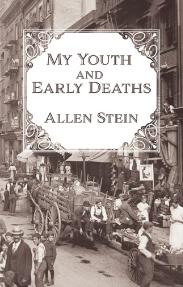
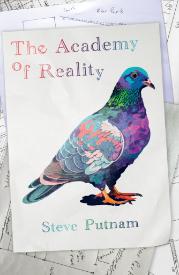
Late one night in the summer of 1897, Morris Massimo Levy, nearly sixteen, of mixed Italian-Catholic and East-European Jewish background, watches as the father of the girl he loves is dropped from the Brooklyn Bridge by the notorious Jewish gang leader (and actual historical figure) Monk Eastman. The event helps propel Morris into a dangerous involvement in the notorious wars between the ethnic gangs of the Lower East Side of New York City and prompts his initiation, despite his idealistic impulses, into the ruthless means one often needed to survive and flourish in early modernAmerica.
A quest for institutional survival, two subversive corporate employees, Sid Sidney a technician and Mia Monroe a would-be shadowartist,getcaughtupintheundertowof office-speak and bastardized metrics tracking printer glitches, insurance profits, lab’s birdseed expenses, and pigeons’ ping pong scores. HR makes things worse, tasking Sid and Mia to co-author an employee benefits booklet, Fifty Places to Picnic.
Mia’s bio clock and Sid’s world population clock blip in-the-moment numbers on tablets, a battle of Darwinian proportions. Although humans and pigeons already overpopulate the Institute, Mia wants a baby.

This anthology of poems and short stories is an homage to Texas singer/song-writer Robert Earl Keen, who stands in the songwriter/storyteller tradition of Townes Van Zandt, Guy Clark, John Prine, and Keen’s contemporaries Lyle Lovett and James McMurtry. The poems and short stories here are each inspired by Keen’s songs, some expansions of themes of Keen’s songs, others move in creative directions suggested by the characters in his work. Keen’s songs are impressive for their literary sensibility (he was an English major at TexasA&M University) and have influenced many songwriters as well as authors of fiction and poetry.

MADVILLE PUBLISHING seeks out and encourages literary writers with unique voices. We look for writers who express complex ideas in simple terms. We look for critical thinkers with a twang, a lilt, or a click in their voices. And patois! We love a good patois. We want to hear those regionalisms in our writers’voices. We want to preserve the sound of our histories through our voices complete and honest, dialectal features and all. We want to highlight those features that make our cultures special in ways that do not focus on division, but rather shine an appreciative light on our diversity.



TheyAll Rest in the Boneyard Now by Raymond LAtkins
“Raymond Atkins writes with intuitive wisdom, as he channels those from beyond the grave. His poetry gives voice to those who once mattered, those who time wants us to forget. In They All Rest in the Boneyard Now, Atkins wrestles death from the dusty clay and breathes life into dry bones while reminding us that every soul who once had breath is worthy of being remembered. These saints, sinners, socialites, and the socially inept are all victims of time, or circumstance, as we tooshall one day be. Atkins offers salvation to all who are tormented, and solace to those who seek eternal rest.” – Renea Winchester,Award-winning author of Outbound Train

“Ann Hite's Haints on Black Mountain was the perfect way to jump start my fall reading. I can't tell you how much I loved being back on Black Mountain with the characters and ghosts we've come to love in Ann's previous Black Mountain books. This book is chock full of short stories, all with a ghostly presence or two. The stories span a long length of time, with the first one taking place in 1835 and the latest ones in the 1990s. Because of the way Hite weaves characters and families through the timeline, we get a chance to revisit them again and again.” Five Star Reader Review

by Robert Gwaltney
"Following in the magnificent footsteps of Carson McCullers and Harper Lee, Robert Gwaltney creates a wonderful snapshot of the friendship that forms between Analeise and Etta Mae, two eleven-year-old girls in '50s small town Georgia... This is a book to love and remember, and every book club in America would be wise to snap it up."- Robert Goolrick, #1 NewYork Times bestselling author
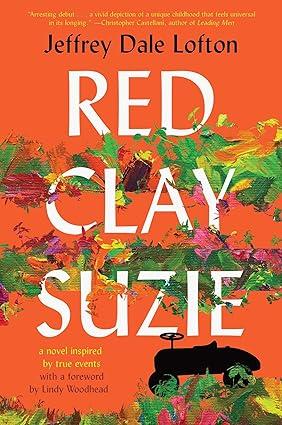
Jeffrey Dale Lofton
A novel inspired by true events - The coming-of-age story of Philbet, gay and living with a disability, battles bullying, ignorance, and disdain as he makes his way in life as an outsider in the Deep South—before finding acceptance in unlikely places. A portion of the proceeds from the sale of Red Clay Suzie go to support the important work of The Trevor Project and the Born This Way Foundation.

The Smuggler's Daughter by Claire Matturro
"... a tightly-paced thriller with authentic and engaging characters that the reader will find it hard to say goodbye to. Reminiscent of the work of novelists like Carl Hiaasen and Tim Dorsey, it's a can't miss for fans of old Florida noir. .." Dennis Maley, The Bradenton Times
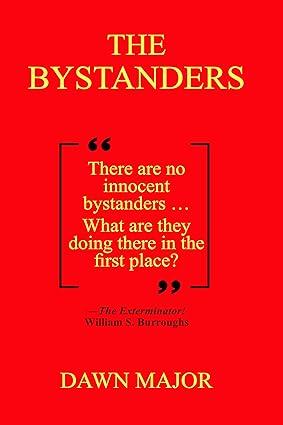
“Without a doubt, Dawn Major is thoroughly schooled in the full-blown existence of jealousy, lust, love, confusion, pettiness, mystery, violence, hope, et al, exhibited by small-town denizens. The Bystanders stands tall in the world of coming-of-age novels”—George Singleton, author of You Want More: Selected Stories
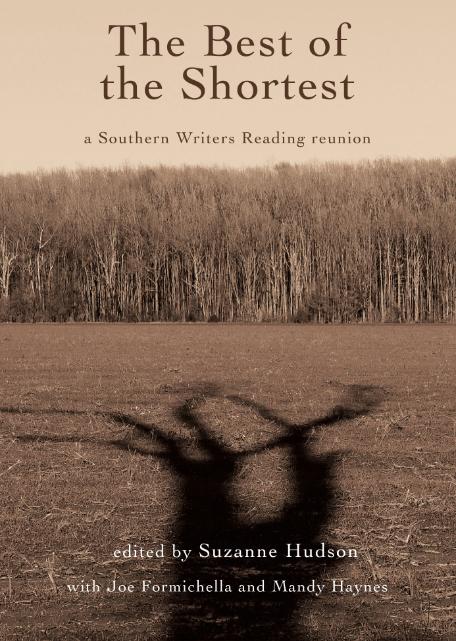
The Best of the Shortest:ASouthern Writers Reading Reunion by Suzanne Hudson (Author, Editor), Mandy Haynes (Editor), Joe Formichella (Author, Editor)
“Some of the happiest moments of my writing life have been spent in the company of writers whose work is included in these pages. They all brought their Agame to this fabulous collection, and at our house it is going on a shelf next to its honored predecessors. The only thing that saddens me is that the large-hearted William Gay is not around to absorb some of the love that shines through every word.” ―Steve Yarbrough
“The Best of the Shortest takes the reader on a fastpaced adventure from familiar back roads to the jungles of Viet Nam; from muddy southern creek banks to the other side of the world, touching on themes as beautiful as love and as harsh as racism. However dark or uplifting, you are guaranteed to enjoy the ride.” --Bob Zellner
“I had some of the best times of my life meeting, drinking and chatting with the writers in this book, times matched only by the hours I spent reading their books. This collection showcases a slice of Southern literature in all its complicated, glorious genius. Anyone who likes good writing will love it.” --Clay Risen
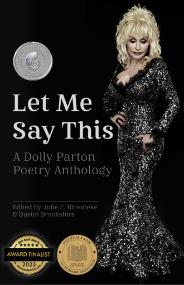
BOOK AWARDS FINALIST 2023, a Book All Georgians Should Read 2024, and NautilusAwards Silver Medalist 2024
54 poets’ takes on often-unsung facets of this diamond in a rhinestone world—calling in Dolly’s impeccable comedic timing, her lyric mastery, her business acumen, and her Dollyverse advocacy.These poems remind us to be better and to do better, to subvert Dolly cliché, and they encourage us to weave Dolly metaphor into our own family lore.Within these pages,Dollytakesthestageandthedinnertable; readers see the public Dolly of the silver screen and the private Dolly of identity contemplation. Dolly raises praise and question, and she butterflies into our hearts to unabashedly to claim the mantra In Dolly We Trust.
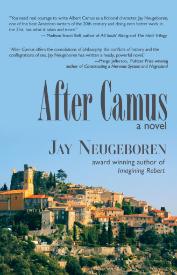
A troubled marriage—and love story—set against the background of the AIDS pandemic, and the American wars inVietnam and Iraq lie at the heart of After Camus. Saul Davidoff and Tolle Riordan, who meet during a protest against the Vietnam War, marry, live through the Plague Years of the AIDS epidemic, raise a family … and burn out. Camus is a hero to both of them: Tolle, a young dancer and choreographer, has a liaison with him in Paris shortly before his death; Saul, inspired by Camus’s The Plague, becomes an infectious disease(andAIDS)doctor…andCamusbecomes a ghostly presence central to our story.
“… After Camus is prone to making keen philosophical observations… its ruminative conclusion both evokes Camus’s work and achieves earned poignancy.” – Forward Reviews
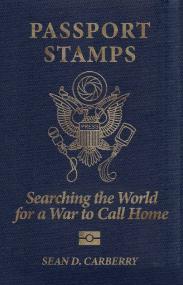
Passport Stamps: Searching theWorld for a War to Call Home is a candid, darkly comic, and emotionally naked tale of a former NPR journalist who—driven by grief, loss, and the desire to find his “tribe”—seeks solace in the world’s most dangerous places and his pursuit to join the ranks of combat-tested war correspondents. The learning curve of reporting in hostile environments is steep and at times comical, at others nearly fatal. He encounters a lot of dust,raggedinfrastructure,weaponry,scary driving, whiskey, lust, and way too much foodpoisoning.Whentheassignmentends, he is left to confront the mental and emotional impact of the years of danger, death, and destruction.

MADVILLE PUBLISHING seeks out and encourages literary writers with unique voices. We look for writers who express complex ideas in simple terms. We look for critical thinkers with a twang, a lilt, or a click in their voices. And patois! We love a good patois. We want to hear those regionalisms in our writers’voices. We want to preserve the sound of our histories through our voices complete and honest, dialectal features and all. We want to highlight those features that make our cultures special in ways that do not focus on division, but rather shine an appreciative light on our diversity.

In Volume One, you’ll find thirty-eight submissions written by a fantastic mix of award-winning authors and poets plus new ones to the scene. Three submissions in this volume were nominated for a Pushcart Prize: Miller’s Cafe by Mike Hilbig, Sleeping on Paul’s Mattress by Brenda Sutton Rose, and A Hard Dog by Will Maguire. The cover art is by artist, Lindsay Carraway, who had several pieces published in February’s issue.
Contributors: Jeffrey Dale Lofton, Phyllis Gobbell,
Brenda Sutton Rose, T. K. Thorne, Claire Hamner Matturro, Penny Koepsel, Mike Hilbig, Jon Sokol, Rita Welty Bourke, Suzanne Kamata,Annie McDonnell,Will Maguire, Joy Ross Davis, Robb Grindstaff,Tom Shachtman, MicahWard, Mike Turner, James D. Brewer, Eileen Coe, Susan Cornford, Ana Doina, J. B. Hogan, Carrie Welch, Ashley Holloway, Rebecca Klassen, Robin Prince Monroe, Ellen Notbohm, Scott Thomas Outlar, Fiorella Ruas, Jonathan Pett, DeLane Phillips, Larry F. Sommers, Macy Spevacek, and Richard Stimac
In Volume Two, you’ll find forty-three submissions written by a fantastic mix of award-winning authors and poets plus new ones to the scene. Three submissions in this volume were nominated for a Pushcart Prize: A Bleeding Heart by Ann Hite, A Few Hours in the Life of a Five-Year-Old Pool Player by Francine Rodriguez, and There Were Red Flags by Mike Turner. The cover art for Volume Two is by artist, DeWitt Lobrano, who had several pieces published in November’s issue. Enjoy!
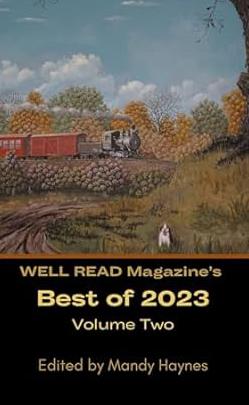
Contributors: Ann Hite, Malcolm Glass, Dawn Major, John M. Williams, Mandy Haynes, Francine Rodriguez, Mike Turner, Mickey Dubrow, William Walsh, Robb Grindstaff, Deborah Zenha Adams, Mark Braught, B. A. Brittingham, Ramey Channell, Eileen Coe, Marion Cohen, Lorraine Cregar, John Grey, J. B. Hogan,Yana Kane, Philip Kobylarz, Diane Lefer, Will Maguire, David Malone, Ashley Tunnell, Tania Nyman, Jacob Parker, LaVern Spencer McCarthy, K. G. Munro, Angela Patera, Micheal Spake, George Pallas, Marisa Keller, Ken Gosse, and Orlando DeVito
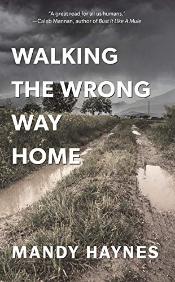
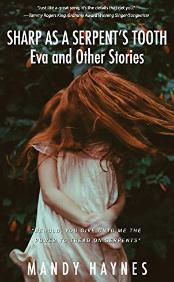
Walking The Wrong Way Home by
Mandy Haynes
Spanning nearly twenty decades, the struggles and victories these characters face are timeless as they all work towards the same goal.
Aplace to feel safe, a place to call home.
Sharp as a Serpent's Tooth: Eva and other stories by Mandy Haynes
Each story features a female protagonist, ranging from ten to ninety-five years of age. Set in the south, you’ll follow these young women and girls as they learn that they’re stronger than they ever thought possible.
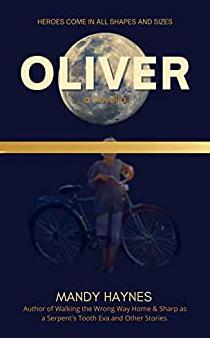
Oliver by Mandy Haynes
“Dear God…and Jesus and Mary…” Even though eleven-year old Olivia is raised Southern Baptist, she likes to cover her bases when asking for a favor. Unlike her brother Oliver, she struggles with keeping her temper in check and staying out of trouble. But Oliver is different, and in the summer of ’72 he proves to Olivia there’s magic in everything - it’s up to us to see it.
Mandy Haynes spent hours on barstools and riding in vans listening to great stories from some of the best songwriters and storytellers in Nashville, Tennessee. After her son graduated college, she traded a stressful life as a pediatric cardiac sonographer for a happy one and now spends her time writing and enjoying life as much as she can. She is the author of two short story collections, Walking the Wrong Way Home, Sharp as a Serpent's Tooth Eva and Other Stories, and a novella, Oliver. She is a co-editor of the Southern Writers Reading reunion anthology, The Best of the Shortest. Mandy is also the editor-in-chief of WELL READ Magazine, an online literary journal created to give authors affordable advertising options that supports and promotes authors of all genres and writing backgrounds. Like the characters in some of her stories, she never misses a chance to jump in a creek to catch crawdads, stand up for the underdog, or the opportunity to make someone laugh.
When you purchase an “ad” for $25, you get a full page slot in WELL READ’s What Are You Reading? section with a live link to your website and a live purchase link of your choice.
Readers asked for full page, easy to read, “book recommendations” in place of traditional looking advertisements and I was happy to oblige.
As a bonus, there are personalized individual graphics made of your book image and author photo (if you choose to purchase a two page spread or more) with your book description and/or blurbs, bio, etc., shared to eight additional FB bookish accounts and to WELL READ Magazine’s Instagram, Pinterest, and Facebook sites –(that’s 39K potential views of your book when you combine all the sites).
WELL READ is distributed through ISSUU (the world’s largest digital publishing and discovery platform available).
WELL READ Magazine receives an average of 8,000 views each month from readers all over the world.
Past issues are available and easily discovered on Issuu’s site. *All PAST issues, including the article and visual stories, remain active and are linked to the current issue. You can continue to share them for as long as you like.
There is strength in numbers. Your “ad” will be included with the featured authors, great interviews, submissions, and the other fantastic books readers look for to add to their reading lists.



“…in the context of Deep Time, I am at best fractional shift in light.”
Robert Gwaltney and Jeffrey Dale Lofton introduce Shastri Akella
Shastri Akella’s debut novel, The Sea Elephants, was published by Flatiron Books in the USAand Canada and by Penguin in India. He was a writing resident at the FineArts Works Center and the Oak Springs Garden Foundation. He is the winner of the 2022 FracturedLit Flash Fiction Contest and the 2023 Best Microfiction Contest.
His writing has appeared in Guernica, Fairy Tale Review, CRAFT, The Masters Review, Electric Literature, World Literature Review, The Rumpus, and elsewhere. Most recently, his story The Magic Bangle was included in The Best American Short Stories 2024, which was edited by Lauren Groff.
He earned an MFA in Creative Writing and PhD. in Comparative Literature at the University of Massachusetts Amherst. He’s currently an Assistant Professor of Creative Writing at Michigan State University.
Jeffrey: I’m always interested in book covers and titles as the way into the story. You've a couple of different covers, but my favorite is the blue, red, and white mask. Why sea elephants? What is the significance of sea elephants, and how does it show up in the cover and the story itself?
Thank you! The cover was designed for the novel by the artist Dave Litman and it is meaningful to me because it stems from a formative moment in the story.
Robert Gwaltney & Jeffrey Dale Lofton introduce Shastri Akella
The main character, Shagun, is a street performer, traveling the breadth of the country with an itinerant troupe of actors and performing stories that have been axed out of conservative translations of the Hindu mythology. When he enacts the role of Chitrangada, a trans character from The Mahabharata, removed from most translations of the epic, he starts to accept his own gender fluidity, an aspect of himself that he has been ill at ease with until then. The cover is the mask he wears when performing Chitrangada.
Robert: I'm so taken by the very different worlds your protagonist navigates, Home, Magpies the boarding school, the street theatre culture, being locked away, and even the small world of the cauldron in which he escapes on his own. All of these are unfamiliar to me and to most who grew up in NorthAmerica. How did you create these places in a way that captivates someone like me who doesn't know of them, has no frame of reference?
I wanted Shagun’s lived reality—the multiplicity of histories and complex cultural spaces he moves through— to be a vital, throbbing part of the narrative geography. I leaned on two narrative methods to make these spaces familiar to readers who encounter them for the first time. Shagun leaves home at sixteen and is on the run from the time he is seventeen. He is a newcomer—an outsider, if you
Robert Gwaltney & Jeffrey Dale Lofton introduce Shastri Akella
will—to nearly the spaces he enters, looking at them not with world-weary eyes but discovering them. So readers discover alongside Shagun and his attitude towards these spaces—curiosity, wariness, comfort, disgust—cue readers on how to code these spaces.
When I revised the novel, I listened for the emotional heartbeat of each of these spaces and I revised to clarify and sharpen its presence so it resounds through the spaces and guides the readerly attitudes towards them the way the color of the wall affects our mental state within certain rooms. And readers, no matter who we are or where we’re raised, are able to anchor into that emotion—the pain of finding yourself alone, the power of feeling visible, the calm force of clarity—and navigate the unfamiliar.
Jeffrey: "If you don't matter, none of your troubles matter." I heard you say that in an interview I saw. I'd love to hear more about this observation and how it relates to your story.
In an essay I wrote for LitHub, I described my experience of feeling alienated from my family in those years when I refused to have an arranged marriage. I found refuge in the hills and mountains of the Himalayas. Their ancient, quiet majesty—the fact that they have remain for centuries before existed and will continue for centuries after I am gone—made me feel gratefully small; not in a way that
Robert Gwaltney & Jeffrey Dale Lofton introduce Shastri Akella
diminished my sense of self but in a way that allowed for ego death that allowed me to see that in the context of Deep Time, I am at best fractional shift in light. That thought released from the vice that my problems held me in, preventing me from looking beyond them and finding an answer.
A character in Arundhati Roy’s God of Small Things articulates this feeling best. He says that if the earth was woman, she would be forty-two years old and all of human civilization is a glint that has just begun to appear in the earth woman’s eyes.
I was a tech employee and never wrote until I was twentyfive and I do not think I would have become a writer or, more importantly, come out without the transformative experience of that ego death. In my novel, Shagun experiences that transformation when he performs ancient, mythic characters. The street theater actors I worked with when researching the novel see the greenroom tent as both a deathbed and a birthing room: it is a space where the self exits the body and the character enters it, the actor ‘becoming’ the character for the duration of the performance. So Shagun, in no longer being himself, in becoming something that is ancient, has that Deep Time experience which allows himself to release the fear and the panic his difficult situation has filled him with. It is then that he realizes ways to surmount those problems, with and through his community.
Robert Gwaltney & Jeffrey Dale Lofton introduce Shastri Akella
Robert: I understand you have an MFA in creative writing and a PhD in comparative literature, but I wonder how your corporate experience with shaped the way you write.
The structural approach to problem-solving at Google shapes my late-stage editing process when I am editing not for content but for the sentence. I want my stories to have a certain sonic quality—to sound a certain way. And when a sentence doesn’t have the aural quality that ‘feels right’, I isolate it by pasting it on a blank document, giving each word its own line. The white space surrounding the text allows me to study and tinker with its sound until it satisfies my inner ear.
It has also shaped my practice as a writer, giving me the discipline of writing every morning. When you work for a corporation, those early hours are the only ones that no one can make demands on and the only time when your mind is clear and not clogged with deadlines or workplace narratives, and I learned how to claim them for writing.
Jeffrey: How does this idea of vertical and horizontal family show up in The Sea Elephants?
I found the idea from Andrew Solomon’s incredible collection of essays, Far From the Tree. Vertical identity is
Robert Gwaltney & Jeffrey Dale Lofton introduce Shastri Akella
the normative phenomenon of family: you are expected to be similar to the biological family that birthed you. The word ‘reproduction’ itself implies that the child will be a replica of their birth parents, having the same values, pursuing the same professions. But when you are an apple that falls far from the tree—a prodigy, for instance, or a queer child—you are perceived as an aberration who has rejected the inherited identity and your biological family often has a hard time comprehending you. And I can tell you that it is an incredibly alienating experience. The isolation I have felt through my twenties is profoundly lifealtering. But when I came out, inAmherst, I was able to find a community that made me feel visible. Those peers and friends became my found my family—I gravitated towards them, we clustered around each other and formed a space of horizontal identity: our affinity was not inherited but rather chosen based on mutual respect and fierce love for our full selves.
Robert: I've heard you touch on the art of subtext in interviews, and I love what you said. Will you talk about subtext and, specifically, how the subtext (that festering need) changed Shagun's story into a love story?
Charles Baxter’s The Art of Subtext is a masterpiece that I wholeheartedly recommend to every writer and serious
Robert Gwaltney & Jeffrey Dale Lofton introduce Shastri Akella
reader. He describes subtext as the narrative energy that festers on the margins until, at some point in the story, a narrative event—an action a character takes, an action that happens to a character—causes it to explode to the surface and it can no longer be ignored. Shagun’s history makes him deeply afraid of physical love, and it is an aspect of himself that he lets fester in his subconscious until he meets the man he falls completely in love with. Then, he must make the choice of facing his fear or losing his love, a choice which causes the fear to erupt from the space of the subtext to an active narrative element that shapes the plot of the story.
Jeffrey: Will you talk about your very exciting news about having a short story in the next Best American Short Story Collection?
The Magic Bangle was originally published in the Rainbow edition of the Fairy Tale Review that was a finalist for the 2024 Lambda Literary Award for LGBTQ+ Anthology. I am tremendously grateful to the editor Benjamin Schaefer for selecting my story, for his editorial insights that strengthened it, and for nominating it for The Best American Short Story anthology.
It was written in response to a homophobic experience I had in my hometown of Hyderabad. I was on a bus when a text
Robert Gwaltney & Jeffrey Dale Lofton introduce Shastri Akella
notification lit up my phone screen where I had a picture of my boyfriend and me on the background. The passenger sitting next to me saw the photo and started shouting at me, a diatribe filled with homophobic slurs and a commentary on how I was defacing the purity of Hindu culture. He drew the attention of other passengers who joined him in his shouting match—picture being surrounded on a bus seat by six or seven, big, angry men yelling at you.
I found refuge from the experience in story: I reimagined the old city of Hyderabad as a queer utopia where homophobia does not exist. That was how The Magic Bangle was written.
Robert: What's next for you?
Without giving too much away: I am working on a fantasy novel set in the near future where America’s white population has become the minority and the conservative regime in power decides to ‘fix this crisis’ by giving political asylum to vampires and documenting them as Caucasian when they arrive at Ellis Island.


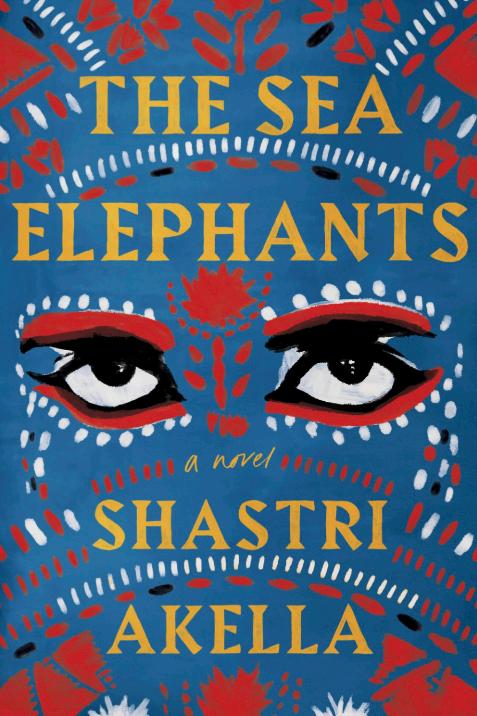
"An exquisite novel destined to be a classic.”
―
Nguyen, author
The Sea Elephants a novel
ShastriAkella
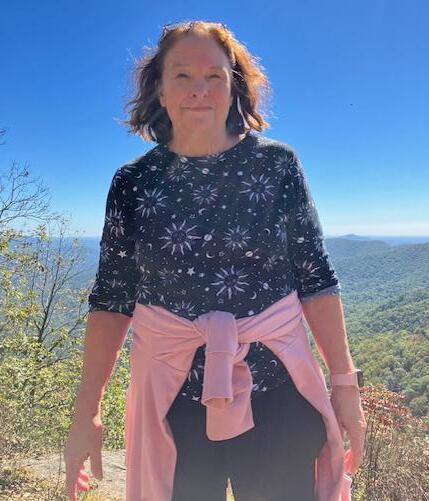
Sometimes mountain magic comes in subtle forms that aren’t noticed until later after one gives some thought to the circumstances.
Dear Reader:
As of this writing it has been four days since this upcoming story took place. The tale is about three women, who decided to hike part of the Appalachian Trail (from here out called AT) in search of a lookout that rivaled all other lookouts. These women were my two daughters, Ella and Cassey, and me of course.
We three were all experienced in day hikes. My honeymoon was a two night backpacking trip in the mountains. We were sure of our skills as hikers and were confident in our choice.
Dear Reader:
Can you see the trouble headed our way? Mountain magic has its ways of straightening out those of us who think we know more than we do.
I blame myself for the events that took place because I should have known better than to take off on a hike without a physical map. TheAT has weak phone signals at best and mostly none. I should have understood the value of a compass, a real hand-held compass. I should have done many things to prepare for this trip.
The day had bright blue skies and crisp cool temperatures. The three of us were staying in a log cabin with AT access within a ten minute walk. The owner of the rental cabin had provided us with written directions to Woody Gap some four to five miles away. We had a good breakfast, dressed, and headed out with four bottles of water, two bananas, and a pack of crackers. After all, we would be back at the cabin for lunch. I estimated the hike one way would be anywhere from eighty minutes to two hours. So the round trip would take no longer than four hours at the most.
Dear Reader:
Please remember these estimations.
We walked the paved road and took the left at the house indicated in our directions. It was a nice wide gravel road that ran in front of a big two-story gray house. I wonder now if the residents didn’t say to each other as they watched us. “There go some more fools.”
We reached an old wooden sign telling us we were about to step on Henry Gap. This was nothing but what my granny would have called a pig trail. So narrow we had to follow behind each other to stay on it.
Dear Reader:
Omen number 1 that was ignored. Three independent souls from city life out hiking on their own. How good could the day get?
When we reached the AT ten minutes later the path was slightly wider and hugged a ridge with a pretty decent drop off into a valley. There was no sign marking the pig trail where we entered to go back to our cabin. Did any of us notice this? Nope. We hopped on the AT and plunged forward.
The narrow ridge trail was littered with rocks and roots. The steep embankment held large outcroppings of boulders here and there. Everywhere were different landmarks to remember. A tree that looked like a loop. A big granite overhang. We couldn’t get turned around.
Dear Reader:
Turned around is another term for lost.
The trail dipped down which is just as hard on your feet and legs as climbing a steep incline. What goes down must come up or level out. The AT was only wide enough for single file walking. Three young men loaded down with large packs came up behind us. We squeezed against the steep embankment to let them pass unless we might be run over.
Dear Reader:
Omen number 2. Some people had done their research and were well practiced for this trail.
The three of us scooted down the path. The sun moved higher in the sky and a strong wind picked up, howling through the treetops. By my calculations we should have been to the overlook…Of course our pace was hampered by steep terrain. My Apple watch was timing our miles at forty-one minutes. How could this be? I walk fifteen to seventeen minute miles every day.At the bottom of a steep incline a babbling brook with a long foot bridge with no handrail waited. I inched my way across in fear I would step off into the water and wet my boots that were not waterproof.
By this point we were silent as we made our way to the elusive overlook. This independent woman was concentrating on not breaking down in tears.
Dear Reader:
I nearly broke out in a hissy fit when we came to the sharpest switchback I had ever seen. Unbeknown to us we were climbing at our steepest point.
I kept encouraging my daughters that the land had to level soon. Both wanted to throw rocks at me. We passed many more hikers coming from the opposite direction. These were through hikers headed to Maine. I personally hated them since I was struggling to hike five miles. The Apple watch told me we were coming up on five miles.This could mean only one thing. We were almost to the overlook. At that moment the sky opened to pure blue and we saw a large exposed granite rock ahead. The view was the grandest vista I have ever seen. I can’t give you the words of what this looked like, only that surely the path to Heaven looks somewhat like this. I was joyously speechless. My breath left my body at the rolling mountains in front of me. My daughter snapped a photo of me with the view in the background. Then we took a selfie together. Smiles of gratitude spread across our faces. Only four hours had ticked by.
Dear Reader:
Remember this was two hours longer than my estimation.
We sat down on the giant slab of granite and ate our snacks and drank water. All was good. We set out about fifteen minutes later for the cabin. Everything was downhill from there. That was a complete lie.
Granny always said I had the ability to know something that was coming. I never took this serious, though at times, a distinct voice would shoot through my head with an important message. As we moved down the path, headed for lunch, I was sure we would be back at the cabin by 2:30. Yes, that was only two hours away but we were moving faster now.
Dear Reader: Does someone like me ever learn?
A voice shot through my head. What about finding the pig trail? Do you know how you will find it? You will be lost. I pushed the voice away and didn’t mention the concern lest I cause a panic. But as hard as I tried to imagine where the pig trail cut off the AT, I couldn’t. Instead I envisioned a clearcut trial beckoning to me.
Dear Reader:
You must see where this is headed.
Up until this point, I have neglected to talk about my hiking boots. Being an experienced hiker, I knew not to wear new boots for the first time on a trail hike. So early the week before, I wore them as I did my exercise routine through the neighborhood at home. Four miles a day for a week. They were wonderful.
Dear Reader:
Did I mention how cute these boots were? They were so cute I decided to forgo the waterproof part and the width I truly needed.
As I began the steep descent, my toes slid into the toe of the boots. Not long after an ache spread across one of my feet and jumped to the other. Keep walking. Keep the pace. That was my mantra.
Dear Reader:
I’m sure you are aware that should you find yourself in the valley surrounded by mountains, you must have a good pair of boots so you can move fast. Darkness sets in much earlier.
The shadows stretched around us when we reached the foot bridge with no rail. This was truly the only place I remembered on the AT. Light began to fall different and trail ghosts began to switch around the view. Nothing looked the same. In all honesty I was beginning to fear the worst.
Ella, my youngest daughter, pulled out her phone to look atthetrailapp. Her phonehad aweak signal. My phonewas dead. She pointed at the map on her phone. “We have passed our cut off trail.”
The whole time we are walking. I know Cassey, the older daughter, heard her sister. I heard her sister, but neither of us acknowledged her point. How could we miss our trail? I was on top of things. In other words, I knew everything. I can admit this about myself.
Ahalf an hour later Ella pointed out her app now showed we had passed our cut off a couple of miles back. Cassey ran ahead to see if the cut off was up the trail some. Ella screamed we had passed the cut off according to the map. This couldn’t be. We had been watching for the cut off. We needed the cut off. It was well after four-thirty. Dark was seeping in. Ella lost signal and Cassey was nowhere to be seen. I stopped in the middle of a steep incline that I was now sure I had never climbed.
God, we’re lost. It took a lot to admit this. Cassey came around a switchback. “Ella’s phone shows we missed our
path back to the cabin.”
“By two miles,” Ella added. My feet were throbbing.
Dear Reader:
I have a high tolerance for pain seeing how I had four daughters using natural childbirth. So, if I say my feet were throbbing, it was excruciating.
“Nothing looked right up there.” Cassey confirmed. “I’ve been saying we passed the path,” Ella said. We started back. By this time I’m limping. Two miles into back-tracking Ella stopped. “This is the path.”
Cassey frowned. “It doesn’t look like a path. Maybe we should keep looking.”
“This is the path,” Ella insisted. It was time for mother to step in with her wisdom. “She said it’s the path. Let’s go.”
Dear Reader:
This is the kind of mountain magic that sneaks up on you, teaching you a lesson. When it comes to the mountains, one can never truly tell where they stand. Both figuratively and literally. There are always lessons to be learned and surprises to be had.
This old woman was never so glad to see a cabin in her life. What did I learn? That I should listen a lot better. That I don’t know everything. That a hiker should never get lazy and so sure of themselves. That these old mountains have seen their share of fools, and on this day decided to spare the three of us, especially the mama who wouldn’t listen to the youngest.
Dear Reader:
That is true grace. Thank goodness for the ability to say you are wrong. But most of all for younger daughters that keep insisting even when no one is listening. Talk about mountain magic!
Oh yeah, I wrote this while soaking my feet. They are on the mend. The hiking boots have been retired to be just pretty shoes for an outing. And we had the best meal I ever ate that night. Of course we missed lunch.
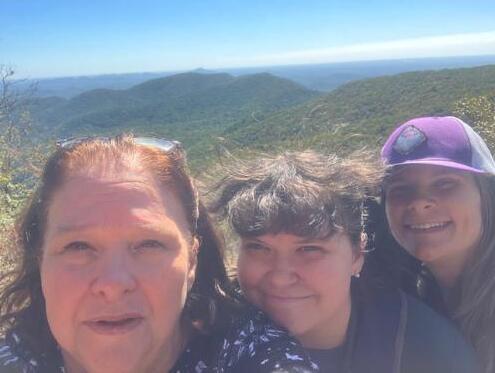


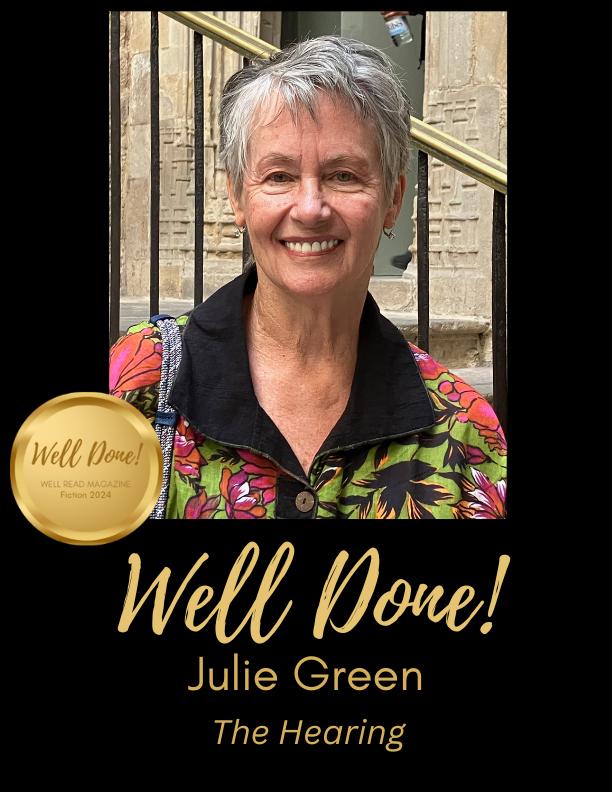
Julie Green
Blair stood on the bridge. The city rose in front of her reflected in the mirrored surface of Lake Clara Meer, the buildings and newly greened trees reversed—her life upside down. She studied the reflection, the still water holding it in perfect balance for a nano second before a breeze nudged the edges and the landscape seeped into a soft watercolor. The analogy suited her. Blair is an artist.
The last time she’d been here was when Jack was having some good days. Like now, it was spring, the warm light a counterweight to the chilled morning breeze. It was so clear, today’s reflection of the cityscape and her memory of that day.
She pushed the big silver cuff up her arm, took hold of the metal rail and let her weight go as she leaned back and looked up at the sky. She breathed in the honeysuckle and freshly mowed grass and turned back to the car thinking,
we are mirrors that reflect it all… the wild orchids and ostriches, cyclones, and the lemon fragrance of the magnolia. She turned her attention to today and the work she had to do for the Arts Council. She was in the city to report to the General Assembly appropriations committee. There was movement to axe the budget, leaving artists and small organizations treading water.
She’d caught a flight from Savannah to be here, then would go on to Charlotte for her opening. Three years of drawings and paintings. She’d worked hard. It would be a big night. But whenever she was away from home, she felt at odds with her internal rhythm. Shellman’s Bluff was her loadstone and the source of much of her work the past five years. The salt marsh and light … last week she’d taken the boat to Blackbeard Island and collected driftwood, shell fragments, lichen; natural forms that contained energy and structure. The critics refer to her work as abstract. She believes people absorb what they need from art, what speaks to their own inner mirror of experience. Her work is based in the objective world; her world of deep stars, dirt roads, rusted road signs and the generative marsh grass that sustains a world beyond the temporal. What drives her to create is the need to reveal that which doesn’t quite exist; to uncover the mystery hidden for our overly stimulated urban eyes. That is the sad futility in artmaking, to animate the inanimate. Yet she works toward forms that are hyper
revealed and embody as much air and energy as the mullet that leap in the marsh.
The car dropped her off at Liberty Plaza. She could hear the traffic from I85 beyond the groups of homeless gathered in the pocket park. Blair hadn’t been downtown since her residency at the college two years ago. She turned toward the direction of CNN and thought of Jack, his brilliant investigative journalism and work as a correspondent. Sometimes, his loss shifts her off balance.
She turned up Capitol Avenue to the appropriations building where an aid to Stanley Espada, Director of the state Council for the Arts stood on the stairs, waving. Blair crossed the street between press trucks and pedestrians.
“Ms. McKenna, thank you so much for coming. Your presence and support of the councils’ work is so welcome now.”
“I’m glad to be of help. Stan and I go way back to high school. He was editor of the lit journal and regularly rejected my overly dramatic poetry.” Blair’s laugh joined the warning beeps of a truck backing up in the street. “I have about an hour before I need to leave for the airport. I just sent him a text that I’m so sorry I can’t stay for lunch.”
“Yes, he knows about tonight’s opening and is grateful for your time. Follow me to the hearing room. You’ll be seated at the table with a mic. The committee members are in front, press behind and on the side. I’ll sit behind you if
you need anything. The committee chair will welcome you and invite you to share your remarks. We have a lineup of celebrities going to bat for us today. Janelle Monae will be in this afternoon.” The aid almost danced. Blair turned and looked at the street. “I hope the press trucks mean you’ll get airtime.”
“That’s the plan. Big names translate to 6 o’clock news. The budget for the Council has never faced such big cuts.” The assistant motioned toward the crowded hallway. “I doubt the committee members will have questions, so you’ll be excused after your report, and I’ll get you back to the Uber for the flight.”
Blair walked into the paneled room lit with brass sconces flanking the state seal. It was a sober room with polished wood that had witnessed political schemes and plenty of smoke danced over decades to lead the state forward or propel an inflated ego into the public eye. The committee members were seated in a semi-circle on a dais in front of her, well above everyone else in the room. The press was moving and shooting as she took a seat and placed her notes on the table alongside a tray of glasses and pitcher of water shedding condensation onto a white linen napkin.
The chair gaveled the room to order. “Ladies and gentlemen, this committee will hear testimony regarding the budget for the Georgia Council for the Arts 2025-26. Our first guest is Ms. Blair McKenna, artist, recipient of a
McArthur Fellowship, and noted art’s advocate. Ms. McKenna, the committee has your written report, you have five minutes.”
“Thank you, Mr. Chairman. The Georgia Council for the Arts is a strategic arm of the Georgia Department of Economic Development whose mission is to cultivate the growth of vibrant communities through the arts. That, as you know, is the mission statement. Last year sixty-seven organizations in 50 counties received $600,000 in funding.” Blair looked up into the eyes of the representatives. “Art touches lives and changes people. Art has the capacity to bring people together and make better human beings. I believe that the arts are essential. I’m going to give you a couple of examples.
“Jenkins is the poorest county in Georgia. The county was awarded a grant of $6,000 to send the Lark String Quartet, and Rising Ozark Bluegrass Ensemble to three county middle schools for six public concerts this past year. The program served over 1,200 residents of the county and employed eighteen musicians and arts administrators.” She glanced up to see most legislators were listening. There’s much more that she’d like to say but won’t.
“The Education Grant supports arts in schools throughout the state. Woodley Elementary received a grant for the fifth graders to explore theater. They worked with actors and a tech team. All 68 students wrote their own
monologue coached by local actors. They teamed with a high school student and with the guidance of a resident teaching artist, collaborated to create a visual to support the monologue. An exhibition of the pieces along with the printed monologue was installed in the Moultrie Arts Center. The building was open every day for the community to come and enjoy the exhibits at no charge.” Blair paused and with an expressively elevated eyebrow continued. “Each afternoon, students flash mobbed and presented a dramatic monologue in the gallery space. The center saw the largest turn out post-covid.
“Bartow county used a program grant to send dancers into four elementary kindergartens to teach literacy. This innovative program introduced in South Carolina has the students move to the sounds the letters make and create the letters with their bodies. Studies have shown that combining kinesthetic pedagogy with standard reading fundamentals increases literacy by 34%. The program will continue for three years, and the students will be tracked throughout grade school to compare their outcomes to their peers.”
Blair rested the notes on the table and surveyed the room, then went off script. “This is three programs out of the Council’s over 200 performances and exhibitions. Some of them may not be your cup of tea.An agency with a diverse task by nature produces a wide-ranging wash of offerings.
But if five kids from Moultrie are swept up in the process of making art or theater and become employed in the arts, or three kids in Tift begin to study the cello or piano, or an entire grade level surpasses their peers in reading ability, it’s worth it. The arts change lives, not only for the participating children, but in the ripples circulating to their families and friends who watch them as they grow into more complete human beings.” Blair pushed her readers on the top of her head like a headband and sat back.
“Thank you, Ms. McKenna for your report and your lifelong advocacy for the arts. Do any members of the committee have a comment or question for Ms. McKenna?”
The Arts Council director had prepped Blair and the ranking minority member to bring out the salient statistics.
“Ms. McKenna, can you tell us if the study of art in grade school and college is an investment in the state’s economic vitality?”
“Yes, Representative Holland.Arecent study by Boston College has shown that individuals who consider themselves entrepreneurs and whose work led to patent rights were more likely to have reported an educational background in the visual arts.”
“And could you tell us, overall, the economic impact of the arts in Georgia?”
“In 2020, Georgia’s arts industries employed 134,217
workers. The state budgeted 1.8% to the Georgia Council. Despite unprecedented challenges during Covid, the industry contributed $23.8 billion, or 4.2% GDP to the state’s economy.”
Blair sat back and pushed the silver cuff up her arm. She had gotten her stats in. The last one, illustrating the staggeringly low amount budgeted to the arts each year by the state government would be repeated by each of the guest artists to make sure it was picked up by the media. She was thinking about getting to the airport when Dewey Pruitt, the congressman from Appling County flicked a finger to speak. He was thin and angular with a pallid complexion and the feral baring of a rodent. The progressive members of the committee shifted in their seats and the director’s aid pushed a note into Blair’ hand. ‘He will try to deflect from your report. He wants the spotlight. Ignore him.’ Blair looked out at the committee members while the press turned mics and cameras to the congressman.
“Ms. McKenna, we thank you for your presence with us today. I just want to clarify if I may. Is the Blair McKenna here today lecturing us on spending taxpayer’s money on banjos in swamp East Georgia, the same Blair McKenna who was implicated in the mysterious death of the journalist, Jack Dickinson?”
Blair felt the weight of rage begin to mount and weld her
to the chair. She’d come too far since Jack’s death to let this snake rattle her or sabotage the focus of this meeting. She locked eyes with Kitty Holland, the ranking minority member who lowered her chin, her steady gaze a ballast. Blair exhaled slowly and leaned forward toward the microphone; her fingers laced together in a taut fist. She raised her eyes and looked directly at Mr. Pruitt. “I believe the congressman is referring to the suicide of Mr. Dickinson, a tragic loss for the country and a painful, personal loss for me. Mr. Dickinson was a brilliant journalist and the kindest of human beings. He would be reluctant to point out that the discussion of his death bears about as much relevance to the GCA budget as the congressman caught on video surveillance fucking an intern in a janitor’s closet. I however have no such reservations.”
There was an explosion of camera clicks, a ‘whoop’from the gallery and scattered applause. The congressman’s pasty complexion bloomed an odd shade of purple. The ranking minority member stifled a laugh and the Chair gaveled for order. “If there are no further questions the committee will recess for a break and continue with our next guest at 10:45. Ms. McKenna, you are excused, and we thank you for your time with us today.”
Congresswoman Holland gave her a subtle thumbs up and slowly nodded her head as Blair gathered her things.
She rose and was escorted from the hall by the aid toward the exit and awaiting car. Press and photographers followed her shouting questions: “You weren’t implicated in Jack Dickinson’s death, is that correct?” “When Mr. Dickinson died, how long had you been together?” “Do you include his image or notable stories in your artwork?”
Blair was both emptied and seething. She looked around at the gathering press and small crowd in the lobby, steadied herself, and walked past them to the car. The devastation of Jack’s suicide had been completely disorienting in its scale of loss. Jack—beautiful, sweet poet, revered journalist, had been the love of her life, her champion, and the most compelling man she’d ever met. It was shattering to know that even her love couldn’t overcome the depression. Blair looked out the window as the dome on the Capitol reflected a stark shaft of gold. Grief delayed reality. It took a year and a half for her to hold the fact of Jack’s suicide alongside her work as an artist; to feel she could be a friend, a family member, a functioning human being. The air in the car felt stale. She would get on the plane for the opening and summon the energy to be present and attentive. But for the moment, she dropped her head to her hands and cursed the cosmos for pain, loss, and the unkindness in the world that is never necessary. She wished she could postpone the opening and go back to Shellman’s Bluff. She and Jack had built their lodge at the
Bluff as a retreat. Now it was home, source of her work and vessel for a lifetime of images and memories. She sat up and reclaimed herself, ready for the trip to Charlotte and the intensity of the opening. Then she’d head for home and would be back at the bluff by mid-afternoon. Tomorrow night she would spend some time floating in the kayak and wait for the silent, shooting stars as the shrimp click open the night.
Julie Green is a retired museum curator, wife, mom, lifelong choral singer, and radical arts advocate. She writes in her living room with her dog Tashi who rarely provides inspiration and sleeps a lot. She is currently finishing a novel and putting together a chapbook. Her work has appeared in several journals including Slant, The Reach of Song, Circle of Women (Emory University), and Naugatuck River Review. She is the 2023 and 2024 recipient of the Herbert Shippey Award for Excellence in Southern Poetry, and the Low Country Award for Short Story given by the Southeastern Writers Association.
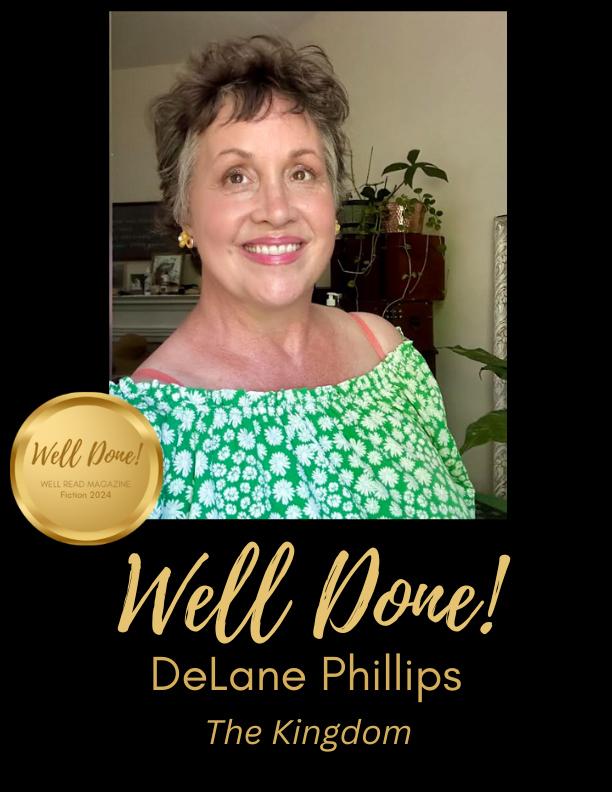
The Sunday School teacher asked the class what the kingdom of heaven was. I got excited because I knew the answer. In last week’s class I didn’t know the answer and I don’t like it when I don’t know the answer.
Last week, I got confused on Paul’s missionary journal travel’s lesson. I couldn’t remember where he was half the time like Eliza Jane. Eliza Jane knows everything. That’s because her daddy is the preacher. Eliza Jane was an expert on Paul and knew where he was the entire class. None of us did. This time no one was going to outsmart me, not even Eliza. She doesn’t like it because I leave off the “Jane” part of her name.
The teacher asked, “Don’t you want to be in the kingdom when you die Eliiizugh Jane?” Eliza is her favorite student.
“Yes, Miz Saw-rulls,” replied Eliza, smiling like Miss America.
I raised my hand. Miss Sorrells sighed. She always does that when I raise my hand. I think it’s because I’m not as pretty or smart as Eliza. Maybe it’s because my Daddy’s not the preacher. Or, it’s because my mother teaches the five year olds. Nobody wants to teach the five year olds. Jesus wouldn’t even take ‘um. They are just plain awful.
Momma teaches the five year olds because she says Jesus loves the little children. I asked Momma if she was sure about that because last month one of the five year olds escaped from class, ran downstairs, out the back kitchen door, across the street, and into the graveyard before Momma caught him. I asked Momma if she whooped him with a Privet switch like she did me when I misbehave. Momma replied, “Of course not, Jesus loves the little children.”
Miss Sorrells knows that I will go home and tell Momma she would not let me answer a question. It’s impolite not to let me answer and that’s not what Jesus would want her to do in front of the class. Especially being a Sunday school teacher and all. That’s why I have all of her attention. And, I know the answer.
Miss Sorrells peered down at me through her diamondedged reading glasses, smiling like a MissAmerica through her carnation-pink lips.
“Yes, Hun?” asked Miss Sorrells. She had that carnationpink lipstick stuck to her left front eye tooth. I wonder if she
knew that.
“Miss Sorrells, the kingdom of heaven is my Granny’s table!” I shouted. All eyes in the class were on me. Bobby Hanley, whose daddy is the superintendent of the Sunday School, giggled from behind me. I would get him after church.
“Come again?” questioned Miss Sorrells, looked confused through the twinkly glasses. Maybe she didn’t hear me. She still had lipstick on her tooth.
“Miss Sorrells, I said the kingdom …”
“Hun, I heard you the first time,” replied Miss Sorrells in her firmest Sunday School teacher voice. “Now, why don’t you eeelaborate on the kingdom to our little class?” Eeelaborate. She wants me to eeelaborate. I think that’s the same thing as preaching.
I hate it when she calls me “Hun.” That’s the special name my aunt calls me when she wants me to paint her fingernails. She always uses the same color, “Berries,” by Revlon. She buys it at the Revco in town. I don’t like Miss Sorrells using my special name. Anyhow, I was not going to let Eliza outshine me after last week’s missionary travels disaster. I was an expert on the kingdom and I was going to eeelaborate. I began to eeelaborate on the kingdom. You know, just like the preacher does.
“Miss Sorrells, the kingdom of heaven is just like my Granny’s table! You see, my Granny don’t go to church on
Sunday like regular folks. She stays home. But my grandaddy does. Granny and grandaddy are members of the Good Hope Congregational Holiness Church. They like him at the church ‘cause he gave them all the land for the outbuildings and such. They built this big ol’ building where everybody can eat dinner after the funerals.”
“What does that have to do with your Granny’s table, Hun?” inquired Miss Sorrells. I knew she was listening.
“Miss Sorrells, after church my Grandaddy brings everybody home to eat dinner. Most Sundays we go down there to eat too, unless Momma’s worn out from teaching the five year olds.” Miss Sorrells was nodding her up and down.
“Granny stays home from the services so she can cook everything. First she goes out to the garden and pulls the corn, cuts it off, and fries it up in a skillet. Wait, before that, she has to kill the chickens. She goes out to the yard, rings a few chicken necks and …” “Yuck” screamed Eliza. Bobby Hanley giggled again.
Miss Sorrells patted Eliza’s head and said, “It’s alright, Hun.”
Miss Sorrells frowned at me. I decided to keep going, regardless of Eliza’s sensitivity. I figured I wouldn’t eeelaborate on the yucky parts since Eliza had apparently never witnessed chickens having feathers boiled off. But, knowing how much Eliza’s daddy ate at church dinners, I’d
say he had a chicken or two.
“Granny fries up them chickens. She might even serve a roast on the side, or ham. While the chickens are a’fryin’in the iron skillets, Granny’s rolling out pans of biscuits. While that’s going, she’ll have a pan o’cornbread in the oven.” Once I mentioned biscuits, I had Bobby Hanley’s full attention. Bobby loves biscuits.
“She bakes the day before.” I named them off one-byone. “Pound, coconut, plain white, plantation, apple, chocolate, white, lemon strawberry ….” The list was endless. I sighed, thinking of all those cakes. The room was silent. I continued to eeelaborate. “There will be a good assortment of pies... say, chocolate, pecan, buttermilk, egg custard, coconut, peach, peanut butter, blackberry, and cobblers! Granny will have pot o’green beans simmering on the stove in the kitchen... she tops off the beans with pieces of quartered white potatoes, sprinkled with black pepper. Sometimes I sneak in the kitchen, lift off the top of the pot, and reach down inside for a tater or two.” All eyes were on me. I bet the preacher never had this much attention when he eeelaborates. In my opinion, if he’d talk a little bit more about eatin’ and less about dyin’, folks might act interested.
“The family shows up to help out. Some will bring a dish, but they don’t have to. It’s okay with Granny if you show up empty-handed. Granny just loves to feed folks. My aunt
always brings “Blueberry Fluff.” Now, there’s a dish even Jesus would love. All eyes were still on me, even Miss Sorrells. I thought I saw her lick the carnation-pink lips. I wondered if that lipstick was still on her tooth. Maybe, I should take her to the side later and tell her, you know, just to be all Jesus-like and nice.
“Go ahead, Hun,” said Miss Sorrells, the twinkly glasses nodding up and down. Her voice sounded just like she was talking to Eliza Jane.
“Yes Ma'am,” I replied. I raised my arms and spread out my hands just like the preacher when he eeelaborated on Sundays.
“All them folks my Grandaddy invites from the Congregational Holiness church come driving up in the yard. They get out of their cars and stand out in the yard talking about the service and the preacher.All the family is driving up at the same time and ever’body gets excited when they see each other, like it’s been years or something. The men are dressed in their Sunday suits and smell like my Daddy’s Old Spice cologne. The ladies are still in their Sunday best dresses. Well, except for Momma. She usually sneaks to the bathroom and takes off her pantyhose because they hurt by that time.” Miss Sorrells’ carnation-pink lips turned down. “Oops.” I forgot I was standing in the presence of boys. I changed the subject. “Everyone comes in through the front porch screen door, into the kitchen.
There’s so many folks and food, the table can’t hold them all! Granny starts putting dishes on top of whatever space she can find. She spreads food onto the top of the freezer and even the dryer. That’s three tables of food! Sometimes, we have to set the desserts in the kitchen by the stove because we run out of room on the freezer and the dryer. Next, the men folk all sit down at the big aluminum kitchen table with the red vinyl chairs. Their wives fix their plates and set them down on the table before them. By that time, the kids have come in and washed up. We all gather ‘round, so Grandaddy can ask the blessing.”
Grandaddy prays, “Good Lord, bless this food to the nourishment of our bodies and our hands to greater service. ..”
Half way through the blessing my mind wanders because of the macaroni-and-cheese. I always get distracted by the macaroni-and-cheese. Miss Sorrells was nodding at me again. I could tell she wanted to know more about that macaroni. “Granny makes her macaroni with spaghetti noodles. She don’t buy no store bought. It’s all homemade. She throws in an egg and some canned milk. But, the best part is the hoop cheese slices she lays on top of the dish. She sprinkles black pepper over the top, just like the taters.”
Bobby Hanley yelled. “Yummy!”
That was as good as an amen to me.
“Grandaddy finally gets to the ‘amen’ part of the
blessing. The men dig into their plates. The mommas are getting children plates of food and sending them out to the porch to eat. Finally, the women get to eat. They sit in the den together, that way they can talk about women things.
Once the men finish their first round, they start passin’ dishes for the second. Granny helps hand them the dishes from the tables, so they don’t have to reach. They pass the meats, then the vegetables: creamed corn, green beans, collards, mashed taters, macaroni and cheese, sweet potatoes, peas, potato salad, cabbage, pinto beans, fried okra....” I shook my head thinking of what was to come after church was over. I couldn’t wait to get out of there. Granny walks around asking, “More tea?”
She waits on everybody. She passes the bread baskets full of biscuits and cornbread. Then she passes her homemade jams and butter. The men all smile at Granny, nod politely, and brag on her food. They tell her to sit down and eat, but they don’t really want her to. They like the pettin’she gives them. We all eat until we can’t hold another bite, completely satisfied. And, just when we can’t eat another bite, guess what?”
“What!” everyone yelled, even Eliza Jane.
“Granny goes in the kitchen and stirs up chocolate gravy.” I eeelaborated. “Oh!” yelled Miss Sorrells, her eyes closed dreamily behind the twinkly glasses. She had licked off the carnation-pink.
“Miss Sorrells, that’s the kingdom of heaven! Everybody’s invited. It’s okay to show up empty-handed. And, when you can’t eat another bite, God’s in the kitchen stirring up chocolate gravy!”
“Amen, Hun, amen!” yelled Miss Sorrells. I think I like her calling me that.
Chocolate gravy: My grandmother, Nina Mae Ashe, cooked a cheaper version of chocolate sauce, using cocoa, butter, which she would have made from her cow’s milk, sugar, and/or canned milk. This “gravy” was cooked as a thin sauce, to be poured over homemade white cake; or, cooked as a thick custard to be eaten alone as a dessert, or thick sauce. I prepared this recipe for my son Johnny, as a toddler. He took his first bite and declared, “Momma, that’s good chocolate gravy.” Hence, the title of the recipe.
Paul’s missionary journal travels: the travels of the apostle Paul, a student of Jesus, who traveled throughout Asia and wrote letters back to the first century Christian church. His journeys are a must for any student of New Testament history.
Privet: An invasive, flowering, bushy shrub thriving among fields and highways of the American South. Like Bobby Hanley, it is almost impossible to get rid of privet; however, its sweet fragrance releases around May, which helps to take away the frustration of its annoying presence.
DeLane Phillips is a Southern voice. She is a mom, a daughter, caregiver, dog mom, writer, and teacher. Many characters and settings featured are from her childhood in Monroe, Georgia. Later in her life, DeLane attended Emmanuel College in Franklin Springs, Georgia, where she was featured in Emmanuel’s annual “Montage,” receiving first place in prose. A few years later, after the passing of her mother, DeLane returned to the muse of much of her writing, her homeplace in Walton County. She continues to write and supports her 83 year old father, as he battles Alzheimers’disease.

The old man ofVistaView kept the grounds of a building in the Mediterranean town of Saranda,Albania.With pearly long hair, and a few teeth peeking from his cavernous smile, his lumbering belly couldn’t be contained by the dingy painters’ shirts he wore. On his swollen feet, his shoes were tattered, and he moved with a patient gait, as he hauled rocks from one end of the complex to the hill below. God would have been able to tell you of his toil. His life of laborious work, his wife at home griping because of his inability to provide for his family. But the old man of Vista View was not educated, his parents never had the means to send him to school, and at 17 he had to fight in a civil war which he didn’t side with.After 8 long years of shimmying belly down in the dust and heat with an AK47 he really didn’t use, he was finally discharged, and the war was declared over. Under the next dictatorship of twenty years, he worked as a laborer in the spring and summer, and
mainly as a meagerly paid cleanup personnel for the city each winter.
His wife, who bore him three, grew more disenchanted with each kid. Angry that the old man of Vista View had impregnated her, saddened by her aging skin and weathered features, and embittered by the expectations for women without a present man. She would tax him with her distress daily. Nagging and complaining, weaponizing her sex, painfully pointing to all his shortcomings when he was going about his work about the house. “Why have I not been built the villa you promised?”, she would growl. “When are you going to fix the roof”, and “Why would I want sex when you cannot afford the children we have?” And who could blame her the old man would think. He was not a wealthy man, many of the previous neighbors had already moved into new houses, or nicer buildings. Though most had taken up black market activity to stay wealthy, they were still able to send their kids to nice schools in the capital.
His kids had remained ignorant. He had no ability to send them to private tutors to learn English, Spanish, or Italian. He had nothing but a life of toil to offer them, and yet he was patient and kind to them.And each day after school he would take his kids out in his dungy and teach them how to fish or have them help him in their little garden and he would explain the principles of life. Patiently, he would tell
them the importance of always being compassionate and kind, no matter what life brought your way. Of how Karma works, and what each stage of life will bring.When his kids would come home with red slips for missing homework, or pink slips because of a disciplinary intervention, instead of yelling he would spread his arms and wrap them in his love. Because of this, the old man was at ease with how his children were developing.And he was as proud as any other father who would show up to the school in their fancy cars with their loud and arrogant ways. The old man knew that good was in store for his children, if not now, then eventually.
The next day when the old man woke up and went to work, it was only to find his boss was gone. It was Friday, and the old man was supposed to get his paycheck. But this was not the first time that his boss had forgotten to pay him. In fact, if there was a truth about it, the problem was more endemic than this. The old man’s boss would also not buy the materials he agreed to or end up cutting corners in other ways. This fact could have made the old man angry, but instead he simply would remind his boss of his missing paycheck and continue on his way.
So, on this day, as any other, the old man started by going in the back behind the building to begin by getting out his wheelbarrow, and the meager tools he had. He ended up mainly using his bare hands, sifting through the larger rocks
to find the biggest ones to set aside, and the medium ones to be thrown over the side. It was just about noon, the old man knew because the sound of the call to prayer was just over, when down came the young couple who lived upstairs. Instead of following the path down into the city, they turned to him, bringing a little package, and what looked to be a plastic bag filled with some dark looking cakes. Though he could not understand what the couple said, being of a different nationality, he gathered that they had brought him this gift because of his service to them during the previous days. He saw, and thought he heard them say these were chocolate cakes. And he was pleased they had thought of him, so he thanked them loudly, and gave them a wide generous smile.
It was not until they were gone, that the man began to examine the package. He thought to himself, he would have one cake now, and save the rest for his family. But there was something in the package which he hadn’t seen. Oh, it was a blue napkin, and when he took it out, $1,000 fell out. At first, he was so startled he didn’t know what to do. But then he thought of running after the young couple to give it back, for he had not done them bidding to receive anything in return. Then he realized that this gift was given to him in this way for a reason. It was not a challenge to his honor; it was a gift of compassion. This he could accept, he finally decided.
As soon as he began to realize this a large black bird swooped down and snatched up the bills from the ground. There must have been some cake on the bills, for the bird would not have wanted it otherwise. But before the old man could do anything, the bird was up so far in the air, there was no way he would be able to catch it. Instead of crying out in despair or even feeling blue about losing such a prized gift, the old man shook his shinny hair and laughed, took out a chocolate cake and took a big bite. Life is suffering, he knew. To have something taken away before its prize was realized was nothing new. So, for this old man, it was not a burden. He thought to himself, what a nice young couple. Then he picked up his rake and began to sift rocks again, and when he went home though he didn’t say to his wife that the bird had stolen his prize, his wife was pleased to eat a cake or two. She finally admitted loudly “That young couple must have thought you were a nice man.”
As a multilingual & multicultural, Shayla Dodge grew up in the backwoods of the Smoky Mountains of North Carolina. She completed her BA in the Czech Republic and pursued her master’s degree in public policy in India and the Czech Republic, completing it in 2011. Shayla then moved to the US and worked for 10 years in the fields of mental health and education. She served as the chief editor of Herland Newsletter from 2013-15, and her writing has appeared in The Shift Newsletter, Plato’s Caves Online, The Pinecone Review, All Your Stories, and Well Read Magazine. She is currently based in Oklahoma City, Oklahoma.
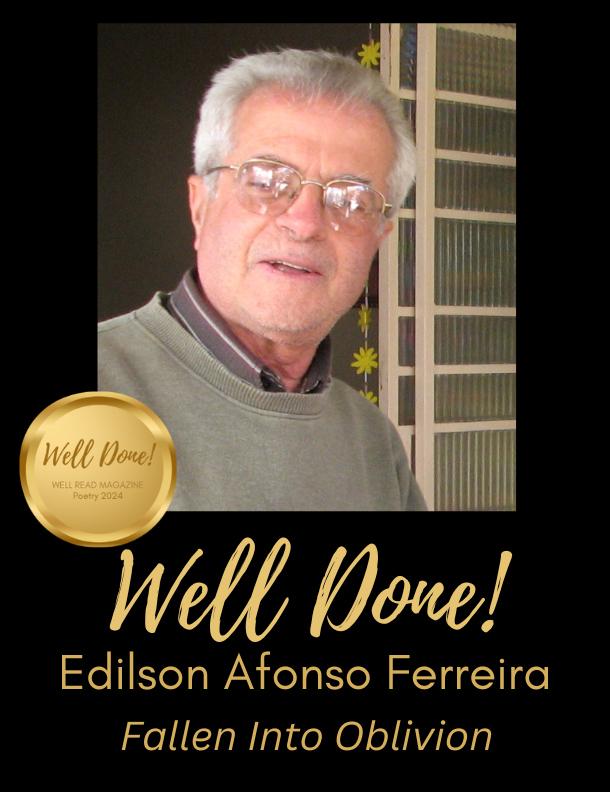
EdilsonAfonso Ferreira
No more guys and girls happily driving open-air convertible cars on weekends, free of seat belts tethering their bodies, sweet winds swaying, fighting, and playing their loose hairs.
No more
children walking on the streets to school, carrying notebooks in their arms, not in backpacks, not on buses.
No more young boys playing marbles in holes they had dug on vacant lots near home, their mates flying kites heavens above.
No more bicycling around only for pleasure, without protective helmets and gloves.
No more family sitting on the front porch after dinner, sharing the latest neighborhood news.
No more walking in the fields by night, under tender and puissant moonlight.
No more people greeting each other and sending good vibes, even if they were unknown.
No more fresh milk bottles delivered home by the morning, but milk boxes at immense supermarkets, with sleepless cameras furtively watching over us.
No more letters, no business letters, no love letters, only emails to be lost in cyberspace.
No more couples who face the difficulties of everyday life, profess mutual and sincere forgiveness,
respect the common oath once made, so engendering true and honest love.
No more parents, sons, and daughters going out together at night, carrying in common dreams, dramas, and desires, like a pack of wolves who have not learned to segregate.
No more growing, assembling, and sharing rooms and lives together, indifferent to some strange customs of those who never knew to love and like themselves, our children becoming children of all of us.
(First published in Fevers of the Mind, July 12, 2023)
Mr. Ferreira, 80 years old, is a Brazilian poet who writes in English rather than Portuguese. Has launched two Poetry books, ‘Lonely Sailor’ and ‘Joie de Vivre’; has 200 poems published in 300 different publications, in international Literary Journals. Has, also, been nominated for the Pushcart Prize. He began writing at the age 67 after retirement from a bank.
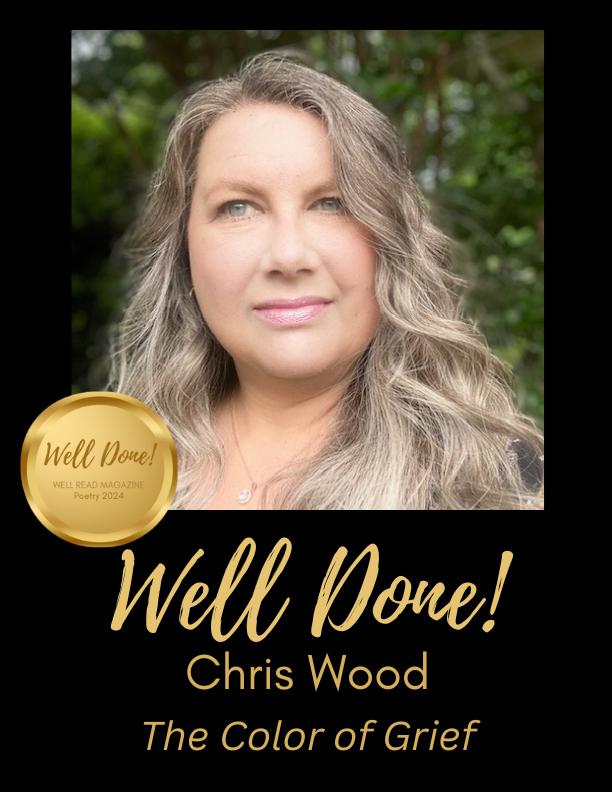
The sun sets in hues of fuchsia and misty rose as shades of my favorite color flood my mind — my pastel pink prom dress, shirts, scarves, and pants I wear daily, the blush tie my husband wore on our wedding day, and my mother, her urn wrapped in pink satin.
I embrace summer, limp through the hot days remembering the color that ignites passion and calms my spirit. Though this year, the dazzle of azaleas, butterflies, and rose quartz paled as Mom slipped away, her soft, coral lips no longer drawing in the fragrance of life.
Chris Wood manages numbers by day, spends evenings cleaning up dog hair from the abundance of love from her fur-babies, and writes in between to balance her right brain from her left. Her work appears in several publications, including Salvation South and Poetry Quarterly. Learn more at https://chriswoodwriter.com/.


By the power of love, relax my wills and burn the hate in the root of ancient oaks from my homeland because I am not the root lands of shame. I do not belong to a small tradition. With the power of love to silence and be a grain of wheat among the vast fields of my plains.
and don't go further of what one thinks to want.
Jasna Gugić is the Vice-President for public relations of the Association of Artists and Writers of the World SAPS; She is a coeditor of the anthology, Compassion—Save the World, one poem written by 130 world poets. Jasna is a multiple winner of many international awards for poetry and literature, and her work has been translated into several world languages. Her first independent collection of poetry was published in 2021, a bilingual English-Croatian edition, entitled Song of Silence. She lives and works in Zagreb, Croatia.
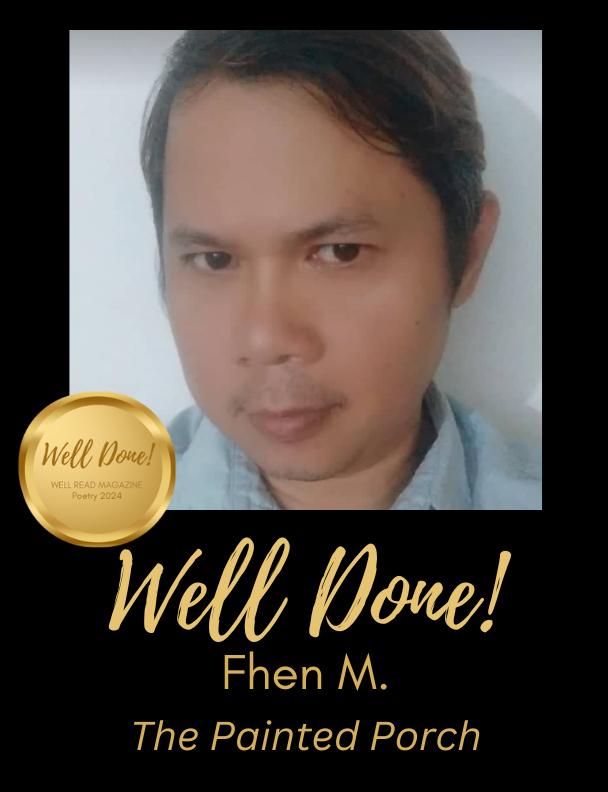
The Painted Porch Fhen M. at the side of the street of Campoyong a space between the ligneous living room & cacophony of the outside world I sit here in the painted porch watching the public crowd pass by on the glass table on the tiled deck reads a journal on realist painter in his oil on canvas El Kundiman a man plays a 1930s piano & a maiden sings a love song now mute indeed are tongue and heart Krebs watches townspeople walk by yet he remains on the periphery.
Fhen M. studied the academic subjects Writing in the Discipline, The Literature of the Phillipines, and The Literature of the World at Eastern Visayas State University. The Waray poem “Uyasan” (“Toy” in English”) written by Fhen M. was published in a collection of literary works entitled Pinili: 15 Years of Lamiraw. His English verses "Lighthouse," “Seaport,” “Barbeque Stalls along Boulevard,” and “Tetrapod” appeared in Poetica anthology series published by Clarendon House. In 2024, Red Penguin Books’About Time: A Coming of Age Poetry Anthology will publish his piece “Outside the Block Universe". One of his poems will also be included in Flora/Fauna Anthology by Open Shutter Press. Fhen M. submitted verses in Waray for the 5th Lamiraw Creative Writing Workshop, including the siday “Duha nga mga pagtug-an” (translated in English as “Two confessions”). David Genotiva, Merlie Alunan, and Victor Sugbo were some of the distinguished panelists of this writing workshop held from the 5th to the 7th of November 2008.


CALLFOR SUBMISSIONS IS OPEN!
*No prompts or themes - no boundaries*
WELL READ is looking for submissions from writers and artists who have stories to tell –through words and art. We combine new and established voices from diverse backgrounds and celebrate different perspectives. We want people who aren’t afraid to shake things up, speak their mind, and share their humanity.
Click here for SUBMISSION GUIDELINES
Please follow the guidelines - all submissions must be sent as attachments and include an author photo and short bio.



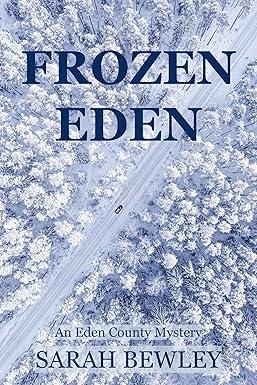

by Sarah Bewley

Burning Eden (Level Best Books 2023), by Gainesville, Florida first-time novelist and award-winning playwright Sarah Bewley, is a skillfully plotted, character-driven police procedural with a surprisingly tender heart given the rising death toll. The novel also has an evocative gloss of Southern Gothic about it, adding to its impact and richness. After all, the story takes place in Eden, a fictional county in north Florida which is being engulfed by smoke as a rampant wildfire burns the nearby swamp—and threatens more than the wilderness. Smoke hangs over everything and everyone and the clock is running out and a villain is kidnapping and killing while leaving cryptic notes behind with quotes from the OldTestament.The tender heart of the story lies with its principal protagonist, a kind, empathic sheriff who only reluctantly entered law enforcement.
As the story opens, swamp land in Eden County is burning and other wildfires burn out of control over the state. This atmosphere sets the stage for the ensuing kidnappings and murders, casting the action in a kind of netherworld scenery. As the author vividly describes the setting: The fires drove the gators and the snakes out to look for water. The smoke from the burning peat kept the county under a grey haze, blocking the sun and filling everyone’s lungs. …[The smoke]
hugged the ground and hung in the tree canopy like Spanish moss gone out of control.
As the fires burn, Sheriff Jim Sheppard’s morning breakfast with his teenage son is disrupted with a call from his office alerting him that a Pentecostal preacher has gone missing. And, according to the man’s wife, the preacher was nude at the time he disappeared. As Jim leaves the house, he reflects at least he has a car to begin the search. His great-grandfather used a horse when he was sheriff. That Jim Sheppard is continuing the family legacy of being sheriff is both a character point and a part of the plot.As the novel develops, readers come to understand why he is both a widower and a reluctant sheriff. When another character is asked to describe Jim, he offers the single word, “kind.”
Two other main characters, Dr. Ryan Edwards and Sgt. Dee Jackson, weave through the developing drama with intriguing consequences. Both contribute not only to the action, but to the vivid depiction of the community. Besides these three main characters, the story is rich with other personalities, including two dogs, countless deputies, a tarttongued newspaper reporter nobody likes, and a photographer with a stash of potentially crime-solving photos.
Dr. Edwards was once a well-respected ER physician in a big city. But after a life-changing criminal attack upon
him and his wife, he is left brain-damaged with aphasia and widowed. His speech issues make his former fast-action, life-or-death medical practice impossible. Seeking a quieter professional practice and a place to rebuild his life, he moves to Eden County and joins the town’s well-respected doctor in a small town/rural clinic. He brings with him a dog, Bonehead, who is not enamored with either Dr. Edwards or Eden County, and a full plate of haunting memories. His character arc in the story is especially well done and rewarding to read.
The third main character is Sgt. Dee Jackson, a nononsense, ambitious Black female officer. The sheriff—and other deputies—respect her and even fear her a bit. With service in the military before landing back in civilian life in Florida, she steadfastly rejects the sheriff’s offer to promote her to captain as she has bigger plans for her professional career. Her role in the plot evolves naturally and the relationship between her and the sheriff is one of mutual respect. Dee’s physical and emotional strength become a saving grace as the plot intensifies.
The town at the heart of it all, Warren, has only 5000 citizens and is the largest in all of Eden County. In some ways, as in the best of Southern literature, the town and the surrounding countryside become characters in the story. Bewley brings alive not only the town’s geography, but the myriads of people who live there and who unexpectedly
Sarah Bewley
find their community in the midst of not only a dangerous fire but a dangerous killer.
Bewley captures both the unfolding drama and the backdrop of nature and weather well throughout the novel. With her excellent attention to setting a scene, she never lets the readers forget the encroaching danger of fire. For example, she writes:
[The sheriff] walked back down the trail and stood in front of the burned out trailer and truck. What the hell was going on in Eden County? First it was the drought.Then the fires. Now he had two men dead and a third missing.
The smoke seems to be dropping from up in the trees toward ground level. The scent of burned wood filled his head. He wondered if he would ever get rid of it.
Burning Eden is a great read and an impressive debut, with clear, crisp, direct sentences, a pace that builds toward a fiery edge-of-your-seat climate, multiple sympathetic and engaging characters, and a villain worthy of the protagonists.All in all, this novel is a compelling work with a strong sense of place, vibrant scenes, well-crafted, believable dialogue—and the rapidly spiraling dangers will keep readers reading well past bedtime.
The second novel in this series, Frozen Eden (Level Best Books 2024), is also now available and continues the story of the kindhearted sheriff and his son, the wounded doctor, and the ambitious sergeant. In this novel, Sgt. Dee Jackson takes the lead in investigating the murder of a promising young woman, found dead from a gunshot in the head yet cradled in the arms of the man she had planned to marry. That man also just happens to be the best friend of the sheriff’s son, so the sheriff steps aside to let Jackson be in charge. Complicating the investigation, the county is caught in a freak cold spell, and the region is all but shut down by icy roads and temperatures in the 20s.
As with Burning Eden, the domestic aspects and character development are well done and as riveting as the police procedure aspects. A fine second book in the series, Frozen Eden is a compelling read and allows Dee Jackson to shine in her expanded role.
Sarah Bewley has been a freelance writer, a playwright, a licensed private investigator, a homeschool tutor, and held administrative positions in medical offices and nonprofits. She resides in Florida, where she has lived for many years.
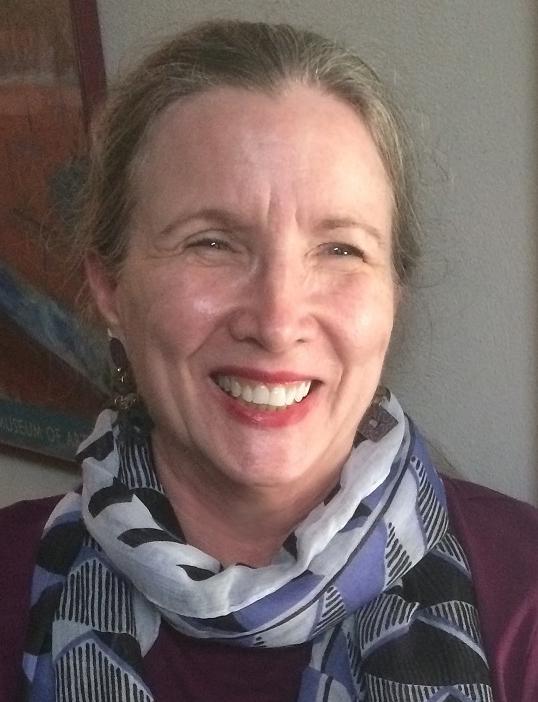

Click the image above to view the trailer for Book 1 of the Eden County Mysteries
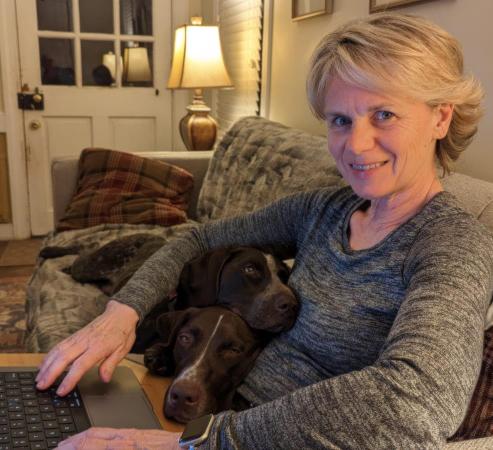
“…I am the happiest I have ever been, right now.”
What is your idea of perfect happiness?
My entire family being in the same place at one time. It is happening less and less because of logistics, and life doing its thing, which is just as it should be. But I miss the big, messy, rowdy gatherings, especially at the holidays.
What is your greatest fear?
Outliving my husband.
What is the trait you most deplore in yourself?
My propensity to procrastinate. If I allow myself to, I can put things off at an Olympian level.
What is the trait you most deplore in others?
Narcissism. A lack of empathy, or emotional sensitivity to others is something that I have a hard time with.
What is your greatest extravagance?
Travel. I was a nomad for over twenty years and lived in eight countries before settling in the USA. The wander lust hasn’t left me but the opportunities to travel are fewer these days. It’s still love it, though, and would give up many other activities to visit somewhere new, or a favorite haunt.
What is your current state of mind?
Contented. I feel incredibly fortunate to say that, and I
never take it for granted.
On what occasion do you lie?
To save someone’s feelings. Total honesty can be cruel sometimes, so a little padding here and there to make it more gentle feels acceptable.
What do you most dislike about your appearance?
My jowls. They run in my family, on my mother’s side, and I’d like to give them back.
What is the quality you most like in a man?
Compassion. Everything else pales in comparison to a man who will make soup from scratch for his wife when she is sick or tell a team member to go home if they’ve returned to work too soon after losing a loved one, who will put on gloves and replace a fledgling that fell from its nest, or sleep on the sofa next to a dog with stitches.
What is the quality you most like in a woman?
Compassion, again. We need more of it in our world.
Which words or phrases do you most overuse?
Are you OK? I say it constantly – to my husband, my sisters, and my friends. I’m sure it eventually starts to grate, but I can’t help myself.
What or who is the greatest love of your life?
My husband. We met 30 years ago, both of us divorced, and a little gun-shy of relationships. But here we still are, more in love than we were back then. It hasn’t always been easy, but I wouldn’t change a thing.
When and where were you happiest?
Is it bad to say now? It took me a while to get here, and there were plenty of struggles along the way, but I am the happiest I have ever been, right now.
Which talent would you most like to have?
Sleeping. I am a chronic insomniac and I’d give pretty much anything to go to bed, close my eyes and go to sleep. To me, that’s more than a talent. It’s a superpower.
If you could change one thing about yourself, what would it be?
I’d love to be more spontaneous, but I am a serial planner. Order makes me happy, but sometimes taking the road less traveled and not stressing about how it will turn out would be refreshing.
What do you consider your greatest achievement?
Staying as close as I am to my sisters, despite living continents apart for a good part of our younger lives.
Because of that closeness, I have five nephews and a niece whom I adore, and I’m grateful that they still enjoy hanging out with me and my husband, even though the ‘kids’are all now in their thirties and forties.
If you were to die and come back as a person or a thing, what would it be?
One of our dogs. They live a charmed life - smothered in love and attention. What could be better?
Where would you most like to live?
In an ideal world, where practicality didn’t dictate, southern Italy. Otherwise, in a peaceful mountain town. Close to nature, with a diverse community, no mosquitos or humidity, and a healthy arts culture. Oh, and an awesome bookshop. Shangri La maybe?
What is your most treasured possession?
A handblown glass bird that contains a tiny swirl of my dad’s ashes. It sits across from where I write, and I talk to him every day.
What do you regard as the lowest depth of misery?
Loss of a loved one. For me, there is no deeper pain than the sense of a part of you being gone.
What is your favorite occupation?
I’ve had a varied career path. Following my first passion, for ballet, I started out as a professional dancer. After an injury, I transitioned into international PR and marketing and was a small business owner before becoming a marketing consultant. Now that I am a full-time author, I am following another passion. It’s been a dream for so many years that I still pinch myself at times that this is my job now.
What is your most marked characteristic?
I’d say being an empath. Most of the time I value it greatly, and at other times, it can be exhausting.
What do you most value in your friends?
Not being judgmental and being able to laugh at themselves. I try to practice both, as often as I can.
Who is your hero of fiction?
Margery Benson of Rachel Joyce’s Miss Benson’s Beetle. She was 100% herself, and I want to be like her when I grow up.
Who are your heroes in real life?
Individuals who work in the medical field. I have met many over the years and they are heroic. From live saving
surgeries to giving a scared patient some words of encouragement, what they do every single day truly makes a difference.
What are your favorite names?
I always use names for my characters that originate in the setting of the book. A few of my favorites are Mirren, Rowan, Ailsa, and Ava for female characters, and Callum, Russell, Grant, and Murdoch for males.
What is it that you most dislike?
Disingenuity. Be honest about who you are, your opinions, and your feelings. Follow through on promises, and we’re all good.
What is your greatest regret?
That my darling dad didn’t live to meet his great grandchildren. He watches over them all, I am sure, but to have seen him hold them would have been a precious gift.
How would you like to die?
In my sleep. No form of death doesn’t scare me, but when I go, I want to be in my husband’s arms. To close my eyes and have his voice be the last thing I hear.
What is your motto?
I’m not sure I have one, specifically, but if I had to choose, I’d say, do as you would be done by.
Alison Ragsdale writes contemporary women’s fiction novels set in the Highlands and Islands of Scotland, her homeland. They are emotionally charged stories about family, love, loss, forgiveness, and finding new ways to happiness despite life's toughest challenges.

“A tear-jerker… Had me on the edge of my seat… The tears I cried could fill a bathtub… My heart was in my throat… I had tears streaming down my face… Absolutely stunning… Beautifully gorgeous tear-jerking page-turner!!!... My heart was completely broken… Beautiful.”
Bookworm Whitlock 86
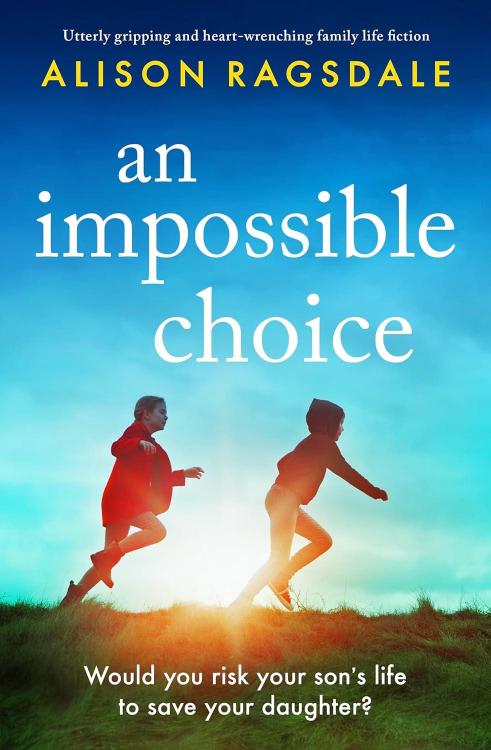
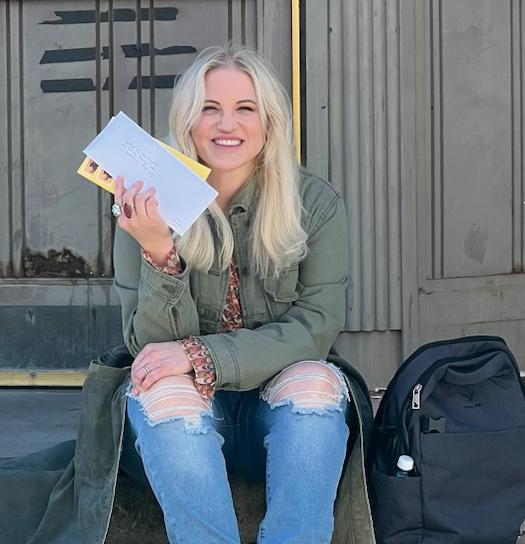
When was the last time you wrote a letter, and I don’t mean an anniversary, birthday, or sympathy card with “hope it’s the best” or “sorry for your loss” or even just “xoxo” and your name scribbled at the bottom of the card? I’m talking about an honest to God handwritten (or typed— I’ll give you that) letter that you wrote for no other reason than you want to share your comings and goings with a friend or a family member who will, hopefully, in turn share their comings and goings. Still pondering my question? I won’t hold my breath.
Is letter writing a thing of the past? We call this the communication era, but is it? Sure, you can call, text, or message someone in less than thirty seconds. You can hit “like” one hundred times per day on your friend’s FB posts or “heart” their Instagram posts but is that really communicating? We live with our faces in our screens in what appears to be a state of constant communication,
apparently communicating, but it’s the exact opposite. Start calling it for what it is: Anti-social media. How many times have you’ve seen a couple on a date scrolling through their phones in silence? I think Banksy’s graffiti art, Mobile Phone Lovers, says it better than I can here. You know it’s true.

(Banksy’s Mobile Phone Lovers, 2014, Broad Plains Boys Club Bristol, UK - photo taken of replica at The Banksy Museum, NYC)
Go ahead and breakupovertext, youscoundrel.

Buttrywritinga loveletter.

Mike Coleman, a fellow author and friend in my artist salon, M’ville, shared his love letters between him and his lifelong partner when writing his memoir, The Way From Me To Us.
Truthfully, the entire book is a love letter, but the point is, those letters encapsulated their love in a manner that would have been impossible to capture with digitized communication.
And further, on the subject of authors and letter writing, I went to listen to Joyce Carol Oates speak at the Decatur Book Festival in Georgia earlier this month. One of the books discussed was Joyce Carol Oates: Letters to a Biographer. Her biographer, Greg Johnson, was in the audience. He started writing to Oates in 1975 and their epistolary relationship continued for years although sometimes it took on different forms including faxes and emails. It’s fascinating what a collection of letters can capture—a whole lifetime as it turns out.
Back in the day—wow, that’s a phrase that has become an all too common expression in my everyday vernacular—
I remember the Sunday out-of-state phone calls (when the rates were cheaper, because yes, my younger readers, phone calls were charged by the minute). Sundays were our designated day to speak with Nana and Papa and Dad, who was usually working out-of-state. Those calls never lasted more than ten minutes with Mom given seven of those
precious minutes and the remaining three divided between me and my two older sisters,Aleea and Julia.
If you are old enough to remember that scenario, you may also recall receiving a recording of unscripted dialogue on a cassette tape from a friend or family member. After listening, you would tape it over with your dialogue about life and mail it back to the sender. I wish I had all those tapes. I do have one from when I spent Easter with Nana and Papa in Sacramento. But overall, letter writing was the least expensive method of keeping up with your relatives. And what a joy to get a letter from Nana! I was envious of her stationary. I still have her letters tucked away; I still have every letter anyone has sent me. And I am not sentimental even though this admission suggests otherwise. Words mean something to me. Someone taking the time to put pen to paper deserves a space in my memory box.
Nowadays, I send friends postcards with some literary quote or an artsy card where I share something about my life and also express curiosity about theirs. But I am a rare species. I can easily imagine my letters displayed in a museum behind glass one day. Okay, that might be taking it a bit far. I am no Hemingway, a voracious and ferocious letter writer. Oftentimes, his letters were rants about other authors he didn’t like. Writers must have tough skin. More than likely my letters will not wind up in a museum. If they did a placard deciphering my horrible cursive—that looks
more like ancient hieroglyphics—would be necessary. I envision a teacher leading a school group while elucidating: “Prior to emails, cellphones, text messages, messaging, prior to Facebook, Instagram, Snapchat, Twitter, Zoom, X, and Tik-Tok people communicated with each other via paper and pens.” That one curious kid will politely raise a hand and ask, “What’s paper? What’s a pen?” Maybe there won’t even be a human teacher. There could be a robotic instructor that spits out information: “A pen is an instrument for writing or drawing with ink typically consisting of a metal nib or ball, or a nylon tip, fitted into a metal or plastic holder and used to write. Writing is the activity or skill of marking coherent words or symbols on paper and composing text. Letters are a written, typed, or printed communications, typically sent in an envelope by mail. The mail is a system that delivers letters and packages conveyed by the postal system. The United States Postal Service is an independent agency of the executive branch of the United States federal government that is responsible for providing postal service in the United States. The robotic teacher will likely not mention my somewhat affectionate (or not, depending on the day) nickname for the USPS – the “blackhole.”
But who knows? Cellphones and social media could go the way of letters. Emails have become largely obsolete. Plus, people don’t even write.AI can do all the work. Don’t
get me started. Shame, shame.
Let me back up a bit. When my stepson, Harry, was in middle school he picked out his Mother’s Day card for his mom and I thought it might be a nice surprise if he mailed the card. I assumed he knew how to fill out the address.This is what the envelope looked like:
He wrote “MOMMA”in great big letters across the front, her address in the top left-hand corner in a straight line going from one edge of the envelope to the other where the stamp belonged. I took over. I wrote her address under “MOMMA” with a C/O and her name under it. Yes, we could have put the card in the new envelope, but he made the effort and it was pretty adorable.
Please don’t think I’m making fun of him. He was never taught how to address envelopes. This was a revelation for me. Perhaps, it was a failure on my part for assuming he knew how. It was something I practiced when I was in elementary school. This is also not an attack on schools, teachers, or curriculums, because letter writing is a lost art. And you know what else is archaic?
Cursive. It’s no longer taught, or at least in the schools my son attended. It’s not necessary. In fact, most students type notes. Cursive isn’t without its faults. When I realized cursive was no longer taught I thought it was my job as a parent (not the teachers) to teach longhand. One summer—
being the wicked stepmother—I bought poor Harry cursive workbooks. He made it through two pages. I let him off the hook. He prints his signature… like most people his age do. I cannot fathom not being able to write my signature in longhand, though. You would be shocked by the amount of time I practiced my author’s signature. This was my usual pastime in eighth grade algebra class. I created about four different ways of writing the capital letter, “D.” I’ve come to terms with not achieving fame, but you wouldn’t know it by my extravagant autograph!
Letter writing is not just cognitive, it’s physical which is why I think people have an issue with the actual act of writing. Hell, it hurts when you’re out of practice. Writing “Happy Holidays, Love (Insert Family Name)” fifty times during the holiday season, causes hand cramps. You shake it off and complain, “What’s the point?” Sure, it’s still fun putting stamps on the envelopes because that part feels like playing with stickers. How can you improve the dreaded writing of the holiday cards? I listen to “Christmas with Sinatra” and use a special pen that I only use to write my cards. If you go the special pen route, do make sure that you put it away in a safe place for next year. I caught my husband casually taking notes with my Santa pen during a work call one day. But more than that, don’t force it. There’s nothing stopping you from sending a New Year’s card, or writing a small note on a random day of the year.
Honestly, those seem even more special because they’re not written in a factory line.
This brings me to the part where I must honor two great letter writers who continue the letter writing tradition—my pen pal, “Papa George,” or George Dilworth, and my dear Uncle Jeff.
Papa George is the king of letter writing. He not only keeps me abreast of his present state of affairs, but he also includes boyhood memories, poems he wrote, his favorite authors (oftentimes with quotes), and his favorite musicians with titles that I Google and listen to. His letters aren’t always full of optimism. He shares his upsets as well. He typically writes on lined legal paper, filling up both sides, but sometimes he sends a card knowing I love cards. I get several letters a month and he has made me a better letter writer. When I travel, I’ve started documenting my daily adventures and I send him pamphlets from museums or tours—my “letterly” destinations.
Most hotels still provide stationary and envelopes. I used to ignore them. Not anymore. I write my pen pal.
As for Uncle Jeff. Year after year, my family eagerly awaits Uncle Jeff’s annual Christmas letter where he documents the past year. Uncle Jeff doesn’t hold back and we all snigger about the great detail with which he chronicles items such as stomach maladies. Oh, he goes there, folks.
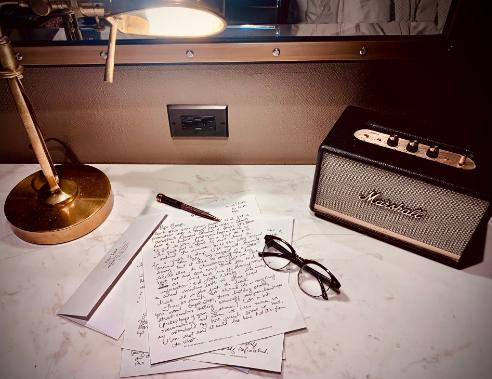
See? That’s what makes a good letter. Papa George and Uncle Jeff don’t sugarcoat life like you get with social media. That’s solely people posting their carefully curated items from their “best of” collection. False realism. In reality, life is so Greek—a mix of comedy and tragedy. Tell the truth. It’s way more interesting. If you enjoy receiving letters you must, must, must respond. It’s give and take. So, two Christmases ago, Uncle Jeff sent his annual Christmas card, but it felt a little light. No synopsis of the year. No dodgy stomach ailments. The
whole family grumbled, “We have been cheated!
Uncle Jeff, where is our annual holiday letter?” He explained, “No one else puts any time into writing letters, why should I?” He was absolutely right, of course. Don’t be that person who simply stamps their name under Merry Christmas and Happy New Year, Happy Hanukkah, Happy Kwanza. Say something. Tell them something quirky about your year, heck, tell them about the bad sushi you ate two months ago. I assure you the reader will find it amusing. It works for Uncle Jeff; it’ll work for you. Uncle Jeff did bring the letter back the following year, by the way, and now my sister, Aleea, has taken up the tradition, so there is hope. I also asked Uncle Jeff to send me all the Christmas letters he has ever written. I hope to put them together for the family one day. He was surprised by how much family history he had documented with those letters.
Flashback: In an effort to introduceAmerican students to different cultures and to assist students from other countries with practicing writing in English, in the seventh grade my teacher told us to select a country and gender because we were getting pen pals. I always went for the Italian boys. I couldn’t wait to get airmail envelopes with exotic stamps, filled with the sheerest, most delicate paper you could actually see through.You can still get a pen pal today, but if you go that route, do be careful giving out personal information and certainly don’t wire your pen pal any
money. Nowadays, most sites offer cyber pen pals. I’d list sites, but I don’t want to be responsible for when your not so “pally” pen pal hacks your identity. My years of working in financial crime have tainted me.
So, to avoid that (sorry pen pal sites), treat your friends and family like your new pen pal and send a card, letter, or postcard. Note: My postcards often end up in that blackhole I referenced previously, so you can always just write on them and pop them in an envelope. Or, here is another thought and something I practice myself, write a note to a family member and hide it somewhere in their house. It’s a small treat—the gift of words—but it goes a long way.
I’d love to hear from readers who decide, after reading my piece, to resurrect letter writing and send a letter or note to someone. Please share what you love and repost.

“…even as we stretch the truth, a core of reality always remains—often drawn from personal experiences that are difficult and painful to revisit.”
Dianne C. Braley
If someone you love was assaulted, abused, or was a victim of a crime—you are a secondary victim. If the perpetrator is also someone you love, there are no words. Madeline and Summer are more than best friends. They might as well be sisters; they've claimed the title, anyway— and sisters tell each other everything. But Summer has a secret she's been hiding for years. Someone's been hurting her, someone close, and when it comes out, it destroys everything around her with the force of dying stars.
Six years after the trial, Madeline is a haunted young woman trying to build a new life in Boston, but the guilt of her betrayal when her friend needed her most—brings her to the brink of suicide. Madeline embarks on a journey to heal from the damage caused by Summer's secret and both her and her mother's terrible response. To let go of the past, Madeline must confront her father, mother, and all those involved with the trial that split her family apart—or
continue her descent into dust, finishing what she started to escape it.
Fiction is never truly fiction, is it? That’s certainly been my experience, and I’m sure many fiction writers would agree. As much as I’d like to say otherwise, the blurb for my next book reveals just how close fiction can come to reality. We call it fiction to give ourselves the freedom to reshape the world around us—to use reality as a foundation and then twist it to fit our imaginations. Fiction offers a break from the constraints of fact, a chance to escape the rigid demands of non-fiction, which can often feel limiting and exhausting. But even as we stretch the truth, a core of reality always remains—often drawn from personal experiences that are difficult and painful to revisit. That’s where fiction becomes a refuge—my refuge, especially in my upcoming book, The Summer Before.
The story is based on real events, ones that were excruciating to live through, let alone write about. But through fiction, by altering the names, places, timelines, and details, I can shift the weight of that pain onto my characters. They become the ones to bear the agony, allowing me to explore it from a safer distance. Fiction offers a unique space to either heighten the turmoil or seek resolution, even when the writer hasn’t found peace themselves.
My book was inspired by a deeply traumatic event: an extended family member was charged and convicted of sexually assaulting his daughter’s best friend, turning our family’s world upside down.At the time, I was in the midst of writing a novel about three girls navigating the tangled web of dysfunctional family dynamics, organized crime, and heartache in my hometown of Boston. One character had been sexually exploited, and a brutal assault was central to the plot. Writing that storyline was already emotionally difficult; I had researched real victims’ stories to portray it with authenticity, as I had been fortunate enough never to have experienced that kind of trauma myself.
When our own family crisis unfolded, it felt as though the ground vanished beneath us—much like the Turkish Twist ride at Canobie Lake Park, a local favorite. As the ride spins, the floor drops out, and riders are left clinging to the walls, weightless and disoriented. That’s exactly how it felt when our family member was charged. My husband was inwardly collapsing, and I was struggling not to be pulled down with him. Yet, in time, a new path emerged, and my purpose as a writer became clearer than ever.
In cases of sexual assault, people often focus on the victims, as they should—their lives, and the lives of their families, are forever altered or ruined. The perpetrator is seen as a monster, a devil.And while that might be true, the
reality is often more complex. Perpetrators don’t always walk around like monsters, warning everyone to flee. Many are beloved fathers, brothers, husbands, or respected pillars of the community. This is what makes it even harder to comprehend.
When the person who committed such a heinous crime belongs to you, it brings shame, guilt, and endless questions. Some family members clung to blind faith, defending him because he was "ours." Others questioned everything, vacillating between doubt and belief. I, however, listened to the trial and came to a firm conclusion that he was guilty. I became a fierce opponent to his presence in our lives, but our responses clashed, and eventually, the weight of our differing views made it easier to avoid talking about it altogether. That silence brought even more shame—the kind that festers as a dirty family secret, the kind you don’t speak of. And all of this was largely unknown to him—the man whose actions had destroyed so many lives.
During the trial, my heart broke for the victim again and again, though I didn’t know her personally. Besides her, the person whose pain haunted me was his daughter, the perpetrator’s child, who took the stand to plead for her father’s innocence. She had not only lost her father but also her best friend—the victim. They had been inseparable, calling each other sisters since childhood. Hearing her
confusion and heartache shattered something inside me that still hasn’t healed.
I began watching other trials, not to focus on the primary victims but to understand the secondary ones—the families of the perpetrators. These are the people no one wants to think about, silently enduring their own form of grief and devastation. Society often overlooks them, as if wishing they would just disappear, but they, too, are victims— forgotten, silenced, and left to pick up the pieces of lives shattered by someone they loved. These are the voices I wanted to capture in my writing—the ones who are too often ignored.
This was a daunting task, and at times, it led me into a dark spiral, balancing the weight of my own writing, my family's trauma, and some people I love’s avoidance of confronting it. I'll admit, I didn’t always handle things as well as I could have. But I felt a fierce obligation to protect the victims—the ones like his daughter and my family, the ones who couldn’t or wouldn’t speak for themselves, and the brave ones who did. I needed people to see that this darkness exists—that evil and unspeakable acts are committed by those we least expect. Until we bring these truths to light and give all victims, both primary and secondary, a voice free from shame—no matter how uncomfortable the conversation may be—we will continue to enable these crimes.
My book is set on Martha’s Vineyard, a place that has always been my sanctuary but one that, as I explored in my first book, took on a darker significance during a difficult chapter of my life. That story, like this one, was fiction rooted in real events—giving deeper meaning to the title here. As part of my journey, I partnered with Martha’s Vineyard Community Services and their CONNECT program, which works to reduce domestic and sexual violence on the island through education, advocacy, and community mobilization. They provide crucial crisis intervention, counseling, and support services for victims, along with ongoing advocacy.
Martha’s Vineyard may be a happy place for many, and it remains a special refuge for me, but it is not—and never will be—immune to tragedy or darkness. No place is. But we can make it safer everywhere by speaking these truths and allowing all primary and secondary victims to feel, express, and heal in the light of their own stories.
A gritty New Englander, Dianne C. Braley found love for the written word early on, reading and creating stories while trying to escape hers, growing up in the turbulent world of alcoholism while living in the tough inner city. After putting her pencil down for a time, she became a registered nurse, finding strength and calm in caring for those who couldn’t care for themselves. Still, she never lost her drive to write. Seeing a painting and remembering a visit to Martha’s Vineyard as a girl and falling in love when her bare feet first stepped on the sand, she moved there for a time, caring for ailing Pulitzer Prize-winning novelist William Styron until he passed. He not only was her patient but soon became her friend and motivator. He and his books helped her realize she missed crafting stories, and she had some to tell. Dianne and her family live north of Boston but never far enough away to lose her city edge. Her multi-award-winning novel The Silence in the Sound was published in 2022, and her new book, The Summer Before, will be born this October.

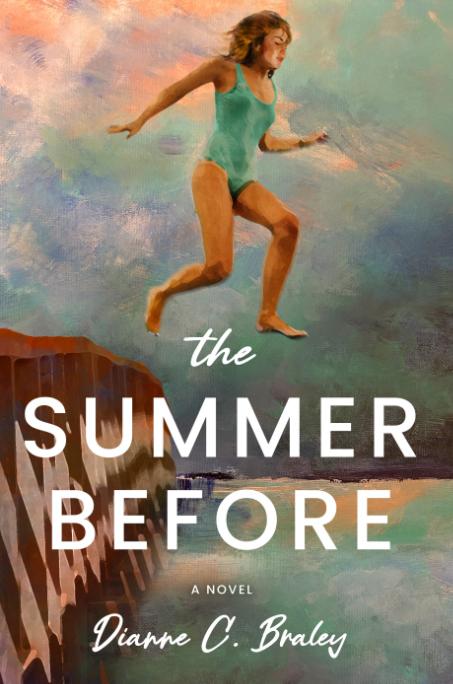
"...a gripping and emotionally charged exploration of trauma, guilt, and the unyielding strength of friendship."
-Anna David,


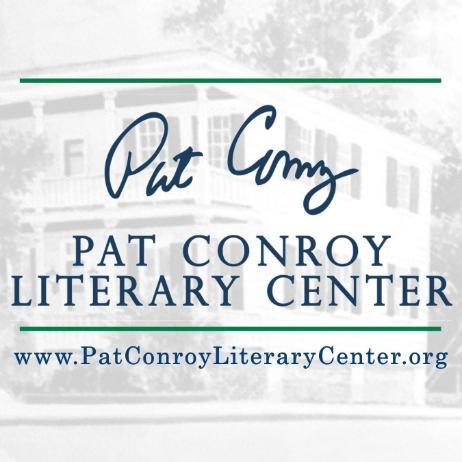






You come to the city because your passion called you here. Whatever that passion may be. That thing you love. And you wander out into the streets searching for a place to pull up a stool, order a drink, chat with the bartender about all things divine.
Welcome to God On The Rocks. Serving up great drinks and soulful conversations since time began.
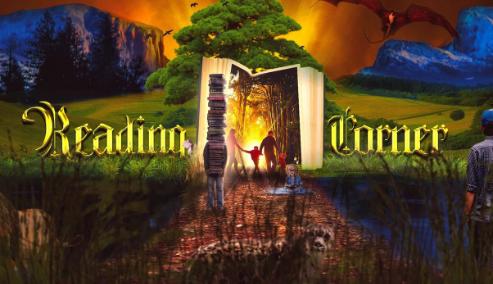












I’m looking for Authors Interviewing Authors and would love to shine a spotlight on your favorite Independent Bookstores, Book Sellers, Libraries, and Librarians.
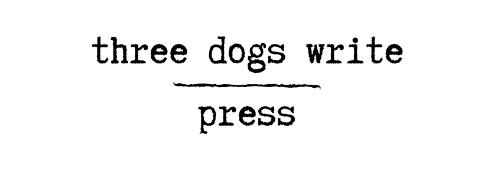

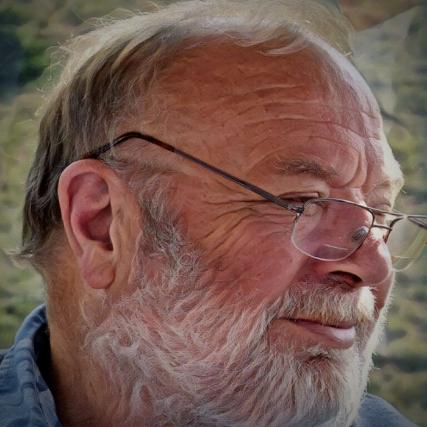
A monthly column that takes us off the page and into the life of
By the time you read this, we will be in the final stretch of the 2024 election cycle, and in my role as influencer extraordinaire, I really wanted to provide some political insights to you, but I ran into an unexpected problem when I shared my plans with Mandy. She became as nervous as Donald Trump at a NOW convention, which is to say, nervous indeed, and the next thing I knew, there was a van parked in front of my house, a nondescript white number with black wall tires, “Rules and Standards” lettered down the sides. I didn’t even know we had a Rules and Standards department here atWell Read, but I suppose ignorance is no excuse, and I guess I should start reading my emails.
The doorbell rang, and when I answered, all three of our company censors bundled into my house smiling tight smiles and looking very serious after apparently having driven all night. They came into my study, sat primly, and asked to see the rough draft of my column. I provided each of them with a copy after first throwing a blanket over the stack of Grab Him By The Ballot signs that were piled in the corner, ready to be distributed. They all read it, and then read it again, and then all three of them placed my work face down on the table in front of them.
Censor # 1: Yes. Well. Hmmm.
Ray: You loved it, right?
Censor # 2: We can’t print this.
Ray: Perhaps my good friend Benjamin Franklin here will help you change your minds?
Censor # 3: No.
Ray: But…but…
Censor # 1: It’s just too political. You’ll have to write about something else.
Censor #2: Puppies and kittens always go over big.
Ray: Well, I guess I could write about my Republican cat.
Censor # 3: No. He’s too divisive. We don’t want to offend any Right-wing cats. What else do you have?
Ray: How about I write about a car I once owned? All Censors (in unison): Perfect!
After they left, I sat down and wrote the following. I guess I got their point, and it’s probably for the best anyway. Folks get too excited when it comes to politics. We live in a time in which we must be on the lookout for people and institutions who would gull us. If you are unfamiliar with that term, according to Merriam-Webster, the definition of gull is: any of numerous long-winged webfooted aquatic birds.Whoops, wrong one.The one I wanted is: to take advantage of (one who is foolish or unwary). Some notable synonyms for gull include bamboozle, con, snooker, and my favorite, cozen. The thing to remember
about being gulled is that it happens to all of us, and that there is no shame in it provided we learn from the experience. Let me give you an example of a world-class gulling I received early in my life.
In 1975 I bought a Ford Pinto. I purchased this car because I was poor and pretty much on foot, and it was cheap, and in my family young men were taught early on to marry good women, vote Democrat, and buy Fords. Ironically, the car I was trading was also a Ford, but I had turned the radio up very loud before I drove it onto the lot so the salesman wouldn’t be able to hear the rod knocking. We made our deal, and he even let me keep the piece of rope that I had tied the passenger-side door closed with, and I found myself the proud owner of a new Ford Pinto.
Unbeknownst to me, however, these little cars were bad to catch fire and blow up when hit from behind, sometimes taking loyal Ford customers with them. By the time I bought mine, Ford was more than aware of the issue but sold it and its tendency to combust to me anyway, but lest ye think that they were doing nothing to address the problem, rest assured that they had a plan in motion. Every time they sold one, they placed some money in reserve just in case that particular Pinto was one of the explosive ones, and this reserve was there to take care of any legal matters that might arise should the hapless but
loyal Ford customer meet his or her demise behind the wheel. I am not making that up. This was really the plan. It was a numbers game, you see, and it was much cheaper for this cornerstone of American industry to pay out the occasional settlement than it was to fix the problem.
So they gulled me. Luckily for me and mine, the Pinto I bought only caught fire once and did not explode at all, perhaps because it was usually in the shop for transmission troubles, and I eventually got rid of the thing before it killed me by trading it in on a Chevy Vega. This was the secondworst gulling I ever got, by the way, but at least it was from a different source, and that is a whole other story for a different time, anyway. At least I was still a Democrat who had a good woman, although we both agreed after a few months in Vega land that perhaps she should pick out the cars in the future, and she has done just that ever since.
The point of the story is that I learned from my gulling, but what if I hadn’t? What if I had doubled-down on the Pinto because I didn’t want to admit I had been wrong? I have this scene in my mind of me and several of my compatriots standing around looking at a burning pile of steel that used to be Pintos. A couple of them are wearing hats with MPGA imprinted on them (Make Pintos Great Again).
MPGA#1: Those Pintos are totally not on fire.
MPGA#2: Totally.
MPGA#3:And even if they were on fire, it would not be their fault.
MPGA#4: Right?
MPGA# 5: Well, what say we go buy some more Pintos? (Agreements all around).
This, of course, could never happen. I mean, people are smarter than that, right?

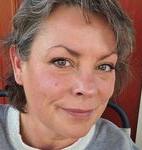
Mandy Haynes is the author of two short story collections, Walking the Wrong Way Home, Sharp as a Serpent's Tooth Eva and Other Stories, and a novella, Oliver. Her stories have appeared in several anthologies and literary journals. She is the editor and designer of Encounters with Nature, a collaboration of Amelia Island Writers and Artists, The WELL READ's Best of 2023 anthologies, and also the co-editor of The Best of the Shortest: A Southern Writers Reading Reunion.




Raymond L. Atkins resides in Rome, Georgia, on the banks of the Etowah River in an old house with a patient wife and a lazy cat. His hobbies include people-watching, reading, and watching movies that have no hope of ever achieving credibility. His first novel, The Front Porch Prophet, was published in 2008 and was awarded the Georgia Author of the Year Award for First Novel. Camp Redemption, was awarded the Ferrol Sams Award for Fiction and the 2014 Georgia Author of the Year Award for Fiction. Sweetwater Blues was a Townsend Prize nominee, the 2015 GeorgiaAuthor of the Year runner-up for fiction, and the 2016 selection for One Book, Many Voices. South of the Etowah, his first creative non-fiction book, was released in 2016. It was nominated for a Push-cart Prize and was the 2016 GeorgiaAuthor of theYearAward runner-up for essay. In 2017, he was awarded the Lifetime Achievement Award by the Georgia Writers Association.

Robert Gwaltney, award winning author of southern fiction, is a graduate of Florida State University. He resides inAtlanta Georgia with his partner, where he is an active member of theAtlanta literary community. Robert’s work has appeared in such publications as The Signal Mountain Review and The Dead Mule School of Southern Literature. His debut novel, The Cicada Tree, won the SomersetAward for literary fiction. In 2023, Gwaltney was named Georgia Author of the Year for first novel.


In September of 2011 Gallery, an imprint of Simon & Schuster, publishedAnn Hite’s first novel, Ghost on Black Mountain. In 2012 this novel was shortlisted for the Townsend Prize, Georgia’s oldest literary award. In the same year, Ghost on Black Mountain won Hite GeorgiaAuthor of the Year. She went on to publish four more novels, a novella, memoir, and most recently Haints On Black Mountain: A Haunted Short Story Collection from Mercer University Press. In December 2022, Haints On Black Mountain was one of ten finalist for the Townsend Prize. The collection was a Bronze Winner in Foreword IndieAward 2023 and GeorgiaAuthor of the Year Second Place Winner for Short Stories 2023.Ann received a scholarship to theAppalachian Witers Workshop Hindman Settlement in the summer of 2020 and was invited back in 2021. Her passion for history influences all her work.


Dean James is the USA Today and New York Times bestselling author of the Cat in the Stacks and Southern Ladies mystery series. A seventh generation Mississippian, he lives and writes in the Jackson, Mississippi area with four cats and more books than he can ever count. He keeps his younger sister Carolyn Haines locked in the attic. Despite his best effort she escapes constantly and wreaks havoc on the countryside.


Jeffrey Dale Lofton hails from Warm Springs, Georgia. His years telling the stories of playwrights and scriptwriters as a stage and screen actor taught him the pull of a powerful story arc. Today, he is SeniorAdvisor at the Library of Congress, surrounded by books and people who love them. Red Clay Suzie is his debut novel, a fictionalized memoir written through his lens—gay and living with a disability— in a conservative family in the Deep South. It was longlisted for the 2023 Center for Fiction First Novel Prize and awarded the Seven Hills Literary Prize for Fiction, among other distinctions.

Hamner Matturro , Contributing Editor for


Claire Hamner Matturro is a former attorney, former university writing instructor, avid reader, and the author of seven novels, including four published by HarperCollins. Her poetry appears in various journals including Slant and Lascaux Review. She is an associate editor ofThe Southern LiteraryReview and lives happily in Florida with her cross-eyed rescued black cat and her husband.


Dawn Major, Contributing Editor for TRIPLIT with D Major
Dawn Major is an associate editor at Southern Literary Review and a graduate of the Etowah Valley Creative Writing MFAProgram. In 2019, she was awarded the Dr. Robert Driscoll Award as well as Reinhardt University’s Faculty Choice Award, both in Excellence in Writing. In 2018, she was a recipient of the James Dickey Review Literary Editor Fellowship. Major is a member of the William GayArchive and has helps edit and publish the late author’s works. She also advocates for southern authors on her blog SouthernRead. She lives in Atlanta, GA with her family. The Bystanders, Major’s debut novel, just won finalist for 2024 GeorgiaAuthor of the Year for Best First Novel.

McDonnell,
Founder of The Write Review Literary Community, Podcaster, Book Reviewer, Author Consultant and Matchmaker. She also teaches workshops on top of all of this! Annie has been introducing us to books and authors since 2006, when she began reviewing books for Elle Magazine. Proud Stiff Person Syndrome Warrior, and several other illnesses.

Junebug Fischer will be ninety-six come June. She's ready to set the record straight and let you know what really happened the summer she turned fifteen. It’s true, she killed someone, but she never killed nobody on purpose. That was purely accidental.
“I don’t know what caused me to shoot the arrow. I didn’t think about it. I just did it. Was it fear or was it pride?”
*Junebug Fischer is a story from Sharp as a Serpent’s ToothEva and Other Stories. You can purchase a digital copy of the story for 99 centsby clicking the link above, or you can purchase a copy of the full short story collection in either paperback or ebook by visiting here.
5.0 out of 5 stars One of the most compelling story/book writers in America.
“Outstanding book. Intelligent, and yet creative, in the best sense of the word. The story/book keeps you engaged right up until the final page. Great, great book!!!”
5.0 out of 5 stars Will leave you wanting more!
“Junebug Fischer is the kind of strong, feisty young lady hero we love, and Mandy's writing of her story draws you in from the start. You'll feel like you're sitting on that porch with her, and I guarantee you'll want more. Her characters come to life in all of her stories, and I recommend you read everything Mandy has written, and will write! You won't be disappointed.”
5.0 out of 5 stars A Southern Voice to Remember
“There's an echo of 'To Kill a Mockingbird' in the voice of the central character here, and I mean that as a high compliment. You'll like her after the first two sentences and root for her the rest of this short but powerful book. I don't want to give anything away. Buy it and read for yourself. 5 stars.”


